#Source problems in antiquity
Text
The gods of Gaul: Introduction, or why it is so hard to find anything
As I announced, I open today a series of post covering what some can call the "Gaulish mythology": the gods and deities of Ancient Gaul. (Personal decision, I will try avoiding using the English adjective "Gaulish" because... I just do not like it. It sounds wrong. In French we have the adjectif "Gaulois" but "Gaulish"... sounds like ghoulish or garrish, no thank you. I'll use "of Gaul", much more poetic)
[EDIT: I have just found out one can use "Gallic" as a legitimate adjective in English and I am so happy because I much prefer this word to "Gaulish", so I'll be using Gallic from now on!]
If you are French, you are bound to have heard of them one way or another. Sure, we got the Greek and Roman gods coming from the South and covering up the land in temples and statues ; and sure we had some Germanic deities walking over the rivers and mountains from the North-East to leave holiday traditions and folk-beliefs... But the oldest gods of France, the true Antiquity of France, was Gaul. And then the Roman Gaul, and that's already where the problems start.
The mythology of Gaul is one of the various branches of the wide group known as Celtic mythology or Celtic gods. When it comes to Celtic deities, the most famous are those of the British Isles, due to being much more preserved (though heavily Christianized) - the gods of Ireland and the Welsh gods are typically the gods every know about when talking about Celtic deities. But there were Celts on the mainland, continental Celts - and Gaul was one of the most important group of continental Celts. So were their gods.
Then... why does nobody know anything about them?
This is what this introduction is about: how hard it actually is to reconstruct the religion of Gaul and understand its gods. Heck we can't ACTUALLY speak of a Gaulish mythology because... we have no myth! We have not preserved any full myth or complete legend from Ancient Gaul. The pantheon of Gaul is the Celtic pantheon we probably know the least about...
Why? A few reasons.
Reason number one, and the most important: We have no record of what the Gauls believed. Or almost none. Because the people of Gaul did not write their religion.
This is the biggest obstacle in the research for the gods of Gaul. It was known that the art of writing was, in the society of Gaul, an elite art that was not for the common folks and used only for very important occasions. The druids were the ones who knew how to read and write, and they kept this prerogative - it was something the upper-class (nobility, rulers) could know, but not always. Writing was considered something powerful, sacred and magical not to be used recklessly or carelessly. As a result, the culture of Gaul was a heavily oral one, and their religion and myths were preserved in an oral fashion. Resulting in a great lack of written sources comng directly from the Gallic tribes... We do have written and engraved fragments, but they are pieces of a puzzle we need to reconstruct. We have votive offerings with prayers and demands inscribed on it - and while they can give us the names of some deities, they don't explain much about them. We have sculptures and visual representations of the deities on pillars and cups and jewels and cauldrons - but they are just visuals and symbols without names. We have calendars - but again, these are just fragments. We have names and images, and we need to make sense out of it all.
To try to find the explanations behind these fragments, comparisons to other Celtic religions and mythologies are of course needed - since they are all branches of a same tree. The same way Germanic mythology can be understood by looking at the Norse one, the same way Etruscan, Greek and Roman mythologies answer each other, the mythology and religion of Gaul has echoes with the Celtic deities of the Isles (though staying quite different from each other). The other comparison needed to put things back into context is reason number 2...
Reason number two: The Romans were there.
Everybody knows that the death of Ancient Gaul was the Roman Empire. Every French student learns the date of Alesia, the battle that symbolized the Roman victory over the Gallic forces. Gaul was conquered by the Romans and became one of the most famous and important provinces of the Roman Empire: it was the Gallo-Roman era.
The Romans were FASCINATED by Gaul. Really. They couldn't stop writing about them, in either admiration or hate. As a result, since we lack direct Gallic sources, most of what we know about Ancient Gaul comes from the Romans. And you can guess why it is a problem. Some records of their religion were written in hatred - after all, they were the barbarian ennemies that Romans were fighting against and needed to dominate. As such, they contain several elements that can be put in doubt (notably numerous references to brutal and violent human sacrifices - real depictions of blood-cults, or exaggeratons and inventions to depict the gods of Gaul as demonic monstrosities?) But even the positive and admirative, or neutral, records are biased because Romans kept comparing the religion of the Gauls to their own, and using the names of Roman deities to designate the gods of Gaul...
Leading to the other big problem when studying the gods of Gaul: the Roman syncretism. The Gallo-Roman era saw a boom in the depictions and representations of the Gallic gods... But in their syncretized form, fused with and assimilated to the Roman gods. As such we have lots of representations and descriptions of the "Jupiter of Gaul", of the "Mercury of Gaul", of the "Gallic Mars" or "Gallic Minerva". But it is extremely hard to identify what was imported Roman elements, what was a pure Gallic element under a Roman name, and what was born of the fusion of Gallic and Roman traditions...
Finally, reason number three: Gaul itself had a very complicated approach to its own gods.
We know there are "pan-gallic" gods, as in gods that were respected and honored by ALL the people of Gaul, forming the cohesion of the nation. But... Gaul wasn't actually a nation. It was very much like the many city-states of Greece: Ancient Gaul was unified by common traditions, a common society, a common religion and a common language... But Gaul was a tribal area divided into tribes, clans and villages, each with their own variations on the laws, each with their own customs and each with their own spin on religion. As a result, while there are a handful of "great gods" common to all the communities of Gaul, there are hundreds and hundreds of local gods that only existed in a specific area or around a specific town ; and given there were also many local twists and spins on the "great gods", it becomes extremely hard to know which divine name is a local deity, a great-common god, a local variation on a deity, or just a common nickname shared by different deities... If you find a local god, it can be indeed a local, unique deity ; or it can be an alternate identity of a shared divine archetype ; or it can be a god we know elsewhere but that goes by a different name here.
To tell you how fragmented Gaul was: Gaul was never a unified nation with one king or ruler. The greatest and largest division you can make identifies three Gauls. Cisalpine Gaul, the Gaul located in Northern Italy, conquered by the Romans in the second century BCE, and thus known as "the Gaul in toga" for being the most Roman of the three. Then there was the "Gaul in breeches" (la Gaule en braies), which borders the Mediterranean sea, spanning between the Alps and the Pyrenean mountains, and which was conquered in the 117 BCE (becoming the province of Narbonne). And finally the "Hairy Gaul", which stayed an independant territory until Cesar conquered it. And the Hairy Gaul itself was divided into three great areas each very different from each other: the Aquitaine Gaul, located south of the Garonne ; the Celtic Gaul located between the Garonne and the Marne (became the Gaul of Lyon after the Roman conquest) ; and finally the Belgian Gaul, located between the Marne and the Rhine. And this all is the largest division you can make, not counting all the smaller clans and tribes in which each area was divided. And all offering just as many local gods or local facets of a god...
And if it wasn't hard enough: given all the sculptures and visuals depictions of the gods of Gaul are very "late" in the context of the history of Gaul... It seems that the gods of Gaul were originally "abstract" or at least not depicted in any concrete form, and that it was only in a late development, shortly before the Roman invasions, that people of Gaul decided to offer engravings and statues to their gods, alternating between humanoid and animal forms.
All of this put together explains why the gods of Gaul are so mysterious today.
180 notes
·
View notes
Text
Calendar manipulation in Ancient Greece
This really isn’t a topic I’m thrilled to tackle, but since the Theogamia there has been so much talk about calendar discrepancies that it looks like the right time to bring this up. Don’t expect this to be eloquent, I’m writing this while absolutely knackered.
I’m not going to focus too much on the problem of modern calendar reconstructions, what I’ll be going into here is the historical evidence we have about how awfully inconsistent the ancient Athenian calendar could be, either by nature or by human intervention over time.
The problem of the new moon
In theory, the Athenian calendar and other Greek calendars are lunar and each month begins on the new moon. Sacha Stern, in Calendars in Antiquity, tells us that the writer Geminus (1st c. BCE), states that the Greek month began when the new moon crescent was first sighted but Geminus also states that the new moon can sometimes be sighted on the 1st of the month, but sometimes not until the 3rd. This statement is interesting, because it implies that, should the moon not be visible (clouds), there was a mathematical basis to the calculation of the months that still made the month begin regardless of what the sky looked like.
There comes also the problem of conjunction (aka when the moon in orbit passes between the sun and the earth, making the moon invisible). The traditional ancient assumption is that the day of conjunction is the last day of the month. However, the interval between the day of conjunction and of the new moon is usually around two days; so if the month began when the new moon was first sighted, conjunction should have been typically on the penultimate day of the previous month.
Those difficulties, along the fact that other authors, such as Aratus give conflicting information leads Stern to say this:
Modern scholars have generally accepted Geminus’ statements that the Greek month began at first visibility of the new moon. However, it is clear on Geminus’ own evidence, as well as on the evidence of the other passages just mentioned, that this rule was not strictly followed, and indeed, quite possibly, that it did not constitute a rule. Moreover, we do not know of any procedure that may have been used, and indeed that would have been necessary, for such a rule to be enforced. There is no evidence, for example, in the whole of Graeco-Roman literature of anyone sighting the new moon.
And this leads us to the rather uncomfortable idea that, in practice, a lot of the calendars simply might not have been as well aligned with astronomical moon phases in the way we conceptualize it today.
Francis M. Dunn, in an article titled Tampering with the Calendar, lists passages from ancient Greek sources that seem to corroborate this idea:
Thucydides 2.28 in a passing mention of a solar eclipse […] distinguishes the astronomical "new moon" or conjunction, at which eclipses must occur, from the conventional "new moon" or noumenia, which followed the first visible crescent. The historian, in other words, is aware that there is an astronomical "new moon" or conjunction which is different from the first day of the civic month.
Man-made adjustments
Because calendars impacted the religious, civic and political lives of each city-states, it wasn’t uncommon for city-states to make adjustments to them.
The type of modification we’re most used to is the addition of intercalary days or month that aim to realign the calendar with astronomical reality. But we have evidence that this isn’t the only motivation.
For example:
In the 430's (SEG XXXVI 12), 420's (SEG XL 12) or 410's (SEG XLII 17), in connection with offerings at Eleusis, the demos instructed the archon to add a second Hekatombaion.
In 228/7 a second Hekatombaion was added to the civic calendar.
Between 294 and 288, in connection with a tour by artists of Dionysus during Lenaion, four cities in Euboea made provision for the archons to add months as necessary.
At the end of the fourth century, probably in 307/6, two days were apparently added near the end of Gamelion.
In 271/0 four days were added in the first decade of Elaphebolion.
As we can see, additions and subtractions of one or several days, if not sometimes months, could happen. They were often added either at the beginning of a month or at the end of a month, which makes it easier to imagine that it could be done to readjust the calendar to the moon, but in the cases where it was linked to a festival, it was clearly done to schedule said festival:
”Of the three cases of intercalary months, two are explicitly related to religious festivals (the dedication of first fruits at Eleusis, IG I3 78; and dramatic festivals in Euboea, IG xii.9 207”
“The evidence therefore supports an assumption that most adjustments were part of the normal operation of the civic calendar - ensuring that the calendar was roughly in phase with sun and moon, and ensuring that festivals would take place at a necessary or convenient time.”
An insoluble debate
The problem of ancient Greek calendars as a whole has been a point of contention among scholars for so long, for the simple reason that it makes dating anything difficult. The most notable example is the one around the differences between the Athenian calendar and the Spartan one when it comes to dating something like the battle of Marathon. Plutarch tells us it was on the 6th of Boedromion, but Herodotus tells us it was during the full moon (and therefore later, if the calendars matched the lunar cycle). This is where the issue of inter-city calendar alignment emerges, since each city-state functioned in their own independent ways, they could resort to calendar adjustments at any time they wanted and further misaligning themselves with one another.
But scholars don’t necessarily agree! Some, like Pritchett believed that the calendars were irregular no matter what, while others like Meritt believed they were regular, and that the evidence of irregularity was due to exceptional circumstances. The problem at this point is that it is much harder to prove regularity than the opposite.
So where does it leave us?
The reconstructed calendars we use today as modern worshippers are all based on some form of regularity, but we need to remember that none of them are a direct continuation of the ancient calendars. For the most part, they are based on the metonic cycle and on the other luni-solar calendars in use today by various faiths and cultures around the world. In fact, a lot of the reconstructions of Athenian calendars are using the same mathematical model as the Hebrew calendar. And that, in a nutshell, explains why different reconstruction have different results when it comes to placing specific days and festivals. So it really comes down to personal choice. Choosing a calendar that is more “popular” might be more appealing to you for particular reasons, while others might choose their calendar based on entirely different criteria. I guess the point I’m trying to get to is that, there won’t be a “standard” calendar without some kind of wide decision to stick to a precise model, and as long as there is no religious authority, the calendars will remain ever so slightly different, because they never really were regular in the way that we understand our solar Gregorian calendar to be.
77 notes
·
View notes
Text
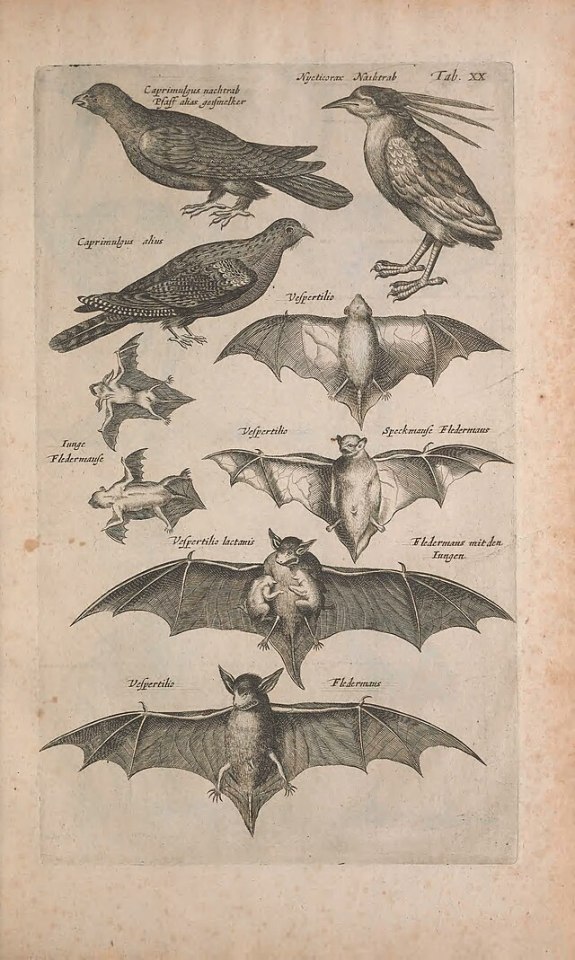
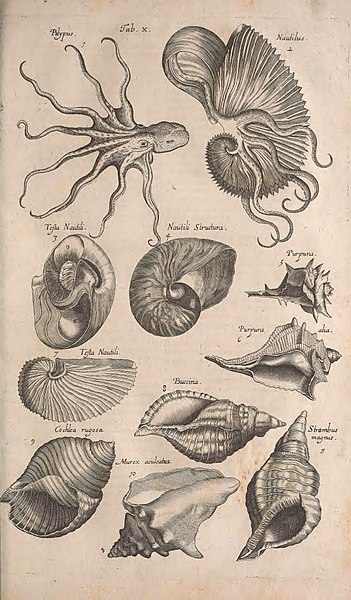
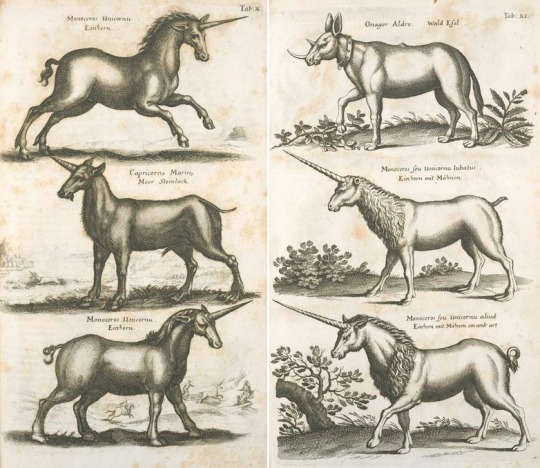
So in writing the history of identification/taxonomy chapter for The Everyday Naturalist, I spent a lot of time poring over scans and reprints of very old western European natural history books. This included a lot of medieval bestiaries, which were usually illuminated manuscripts with the colorful, stylized artwork so common from that era. It wasn't until the European Renaissance that you started seeing more of an emphasis on realistic artwork, and by the time you get to the transitional period between the late Renaissance and the Enlightenment engravings based on original drawings were very common for illustrating books on animals and plants.
A lot of the images passed around as "antique scientific illustrations" stem from the mid-17th century Historiae Naturalis written by John Jonston and illustrated by Matthäus Merian the Elder. By this point in history numerous European nations were sending ships around the globe to bring back resources, which included a significant number of natural history specimens. The sheer variety and biodiversity represented by these gave naturalists in these countries an overwhelming amount of fodder for study, classification, and publication.
However, there was still the perennial problem that not everyone writing or illustrating these seemingly exotic species could access them in person. Medieval bestiaries, and their predecessor the Physiologus, tended to mix natural history with religious allegory, and often the writers had never actually seen the species they were describing. Since they had to go on secondhand (or thirdhand, or fifteenthhand) information, things sometimes got lost in translation like a big game of Telephone. And the situation was still the same by the time Jonston and Merian were working on the Historiae Naturalis.
Which is why that venerable attempt to catalog as many of the animals in the known world as possible includes, amid pages of real animals like molluscs, deer, and bats (categorized with the birds!), you also had descriptions and engravings of six different unicorn species. Jonston did remark that he was going entirely on the word of others and cited his sources wherever he could, but it seems as though most of them were treating the unicorn as a separate beast from the rhinoceros or antelopes. (You can find a scan of the entire Historiae Naturalis de Quadrupedibus here, if you want to read for yourself.)
This is probably the last major natural history work in which unicorns and other mythical animals would be presented as equally real as flesh-and-blood animals; once the Enlightenment got into full swing, the sciences sought empirical evidence, and hearsay was generally no longer considered good enough for publication. So there's something a little charming about this text that bridges the gap between the ancient bestiaries with their blurring of fact and fiction, and the modern emphasis on chasing down the truth behind the myths.
#natural history#Historiae Naturalis#scientific illustration#antique illustration#vintage illustration#bestiaries#science#unicorns#animals#wildlife#nature#Renaissance#medieval art#medieval history#bestiary#history#art history#antique animals
78 notes
·
View notes
Text
Our Game
₊˚.⋆☾⋆⁺₊✧ Wriothesley x f!Reader ₊˚.⋆☾⋆⁺₊✧
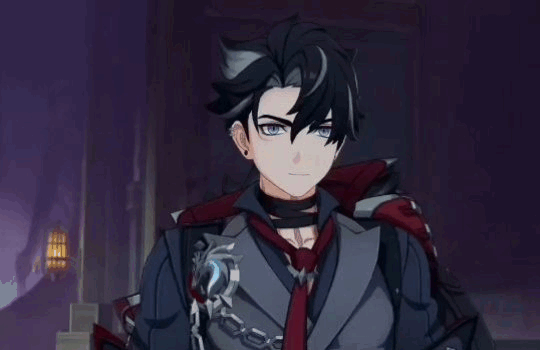
MDNI
ִ ࣪𖤐 Word Count: 5.2k
ִ ࣪𖤐 CW: NSFW, Dom!Wriothesley, Thief!Reader, Mentions of Human Trafficking, Drugged Tea, Slight Bondage
ִ ࣪𖤐 No use of Y/N, Never use of Y/N
The game is lively tonight and you expect to enjoy it in full.
With effortless grace, you move in and out of the shadows around the Court of Fontaine, becoming a phantom of the night. The deserted streets are a ripe playground, businesses closed, doors and windows locked, and the guards drowsy and inattentive. It's a realm of exhilarating opportunity, just waiting for you to claim.
Your destination is the side door of the antique jewelry shop, known as the last source of pride for an elderly proprietor. Your knowledge of every shop in the city is impeccable, following a mistake where you learned that it's unwise to steal from a Fatui-owned establishment; it's akin to pilfering from the Tsaritsa herself.
With a few deft movements, you manipulate the lock, and the door swings open without a sound. The shop's interior is as silent as a tomb, its owners having long retired for the evening. You enter, your eyes alight with anticipation.
You navigate the shop's layout like a child in a candy store, your gaze drawn to the glass cases showcasing a myriad of jewels, each one casting a beguiling shimmer. With nimble fingers, you open the case and select a ring featuring a sizable ruby. You slip it onto your finger, admiring the deep red luster. The ring itself is far from delicate, clearly designed for a more masculine hand – someone like…
You quickly remove the ring, tossing it into your bag. No point dwelling on such thoughts; it's time to collect your treasures and make your exit. You work swiftly, carefully placing necklaces and bracelets into your waiting bag, ensuring the displays remain untouched.
The unmistakable sound of heavy boots approaching makes you freeze in place, listening to the resonant thud of leather shoes and the subtle jingle of chains and cuffs. It's time to depart. You wrap up your mission with meticulous precision, and as swiftly as you had arrived, you vanish into the night. Peering from the safety of an alley, you remain silent, unable to spot the approaching figure. Even worse, you're uncertain of the direction from which he's drawing near.
Taking on the rooftop is undoubtedly the better choice. Climbing up the copper gutter pipe, you gain a sweeping view of the city from the high vantage point. From here, you can easily traverse the rooftops, leaping across buildings and making swift progress. As the immediate danger lessens, you descend to the streets below.
Suddenly, that distinct sound returns, the one signaling his presence. How did he catch up to you so fast? It's time for plan B. You snatch a dark cloak from a nearby stall and quickly drape it over yourself, making a dash for the nearest stationed Garde.
"Oh! Garde! Monsieur!" you implore, rushing up to the uniformed soldier. The young man, evidently new to the force, turns his attention to you with an eager desire to assist.
"Madame? What's the problem?" he inquires, clearly willing to help.
"I was just at the tavern getting a drink, and I think a strange man is following me! Please, help me!" You plead, ensuring fear reflects in your eyes.
"Do not worry, ma'am. I will take care of this," he assures, stepping around you to face the direction of the approaching footsteps.
"Oh! Thank you so much, Monsieur," you say, masking your sly grin as you slip away.
The guard stands firm, ready to protect the innocent young woman who has placed her trust in him, aligning with the oath to safeguard all citizens of Fontaine. His excitement is palpable.
A shadow emerges in the dimly lit street, advancing slowly. The young Garde stands at attention. "You there! I'd like a word with you!" he calls out.
The approaching figure steps into the light, revealing a large, menacing man. He possesses piercing blue eyes, is adorned with chains and has a pair of handcuffs hanging at his side. His coat is casually slung over his back, and a scar stretches from the base of his neck, disappearing under his clothing.
The young Garde recognizes the man and instantly locks up. "Y-Your Grace! My apologies! I mistook you for a suspect!"
"Suspect? What gave you that idea?" the man inquires, tilting his head gently.
"This young lady, she—" The Garde turns, only to find that you've vanished. "Where'd she go?"
"A woman?" he asks.
"Y-Yes, a woman. She claimed a man was following her," the Garde explains. The man, who moments ago wore a serious expression, breaks into a smirk and chuckles softly.
You've successfully ascended the tower, fully prepared to make your getaway into the cover of the night. Luckily, tonight's escape had proven effortless, and you hadn't even needed to trigger an alarm to elude the Duke of the Fortress of Meropide. He must be accustomed to your flamboyant tricks by now. The two of you had been engaged in this thrilling game for so long that you constantly had to innovate new ways to lead him astray. However, you'd come to find that the simplest tricks were the most enjoyable, especially after the sheer madness you'd put him through as you slipped away.
As you make your way toward freedom, a hand wraps firmly around your wrist, pressing your back into the wall. He looms above you, an unamused expression on his face. The way his stunning eyes seem to gleam in the dim light sends a shiver down your spine.
"Hello, darling," you taunt.
"Give it up. I'm taking you in," he declares with unwavering determination.
"That's what you always say," you mutter, causing him to grit his teeth.
"The bag," he demands, extending his hand.
"You're no fun," you pout, pulling the strap over your head and placing it in his palm. Wriothesley keeps you cornered as he opens the satchel, only to find it empty—no jewels, necklaces, or even a few coins. "Trouble?" you ask with a smirk.
"Where are the jewels?" he asks bluntly.
"What jewels?" you play innocent. He grabs your arms, pressing you firmly against the wall.
"I'm not in the mood for this today," he growls.
"But I'm completely innocent, Your Grace," you say with wide, doe eyes. "Little old me? A thief? Isn't it wrong to accuse someone without any evidence?"
"Enough!" he snaps, pushing you closer, your chests almost touching. You can feel the way his heart races, how you make him nervous. It sends a thrill through you.
"Or was there a different reason you followed me tonight, Your Grace?" you inquire, leaning forward. Your lips are mere inches apart. He tries to hide the way his breath hitches, but your smirk widens. "Did you want me all to yourself? You could've just asked. I'd never refuse." You tease him with expert precision, knowing precisely what to say and do to provoke him. You close the distance even further, his eyes locked onto your lips. Your breaths mingled so closely that your lips could touch if either of you moved even slightly. And just when it seems like he can't take it any longer, you pull away. "Forgive me, Your Grace. Sometimes I forget you're a man of the law, dedicated to your work. Surely, you're far too busy for me to take up any more of your time."
"Shut up," he snaps, closing the gap between you in an instant. He captures your lips, instantly stealing your breath away. His kisses are demanding, his desire to take the lead palpable, and you willingly submit to his commanding presence. His teeth graze along your bottom lip, eliciting a breathy, barely audible moan from you. You press your thighs together, utterly captivated by the way this man has the power to make you unravel. His longing for you has always had the ability to make you tremble, particularly in moments like these, when the game between you two reaches its zenith, when he finally catches you, and both of your desires hit you without reserve.
His hand raises to the back of your neck, tilting your head up, giving him more of you. He's going mad. He has to be. There must be some kind of spell or pheromone that you've cast over him, that makes him need you desperately. Everytime you're before him like this, his morals fly out the window, and his lust becomes so thick he can't resist. He's well aware of the moral dilemma that plagues him. You're a true criminal, through and through, and he's fully cognizant of the wrongdoing of his actions. However, he never feels the exhilaration of the chase as intensely as he does when it's with you.
The tranquil sound of water churning brings you back to the present moment. Regrettably, it's time for you to make your exit. Your fingers slide over his vest pocket, and Wriothesley's brow furrows as you withdraw from the kiss.
"Gotta run," you murmur, slipping out of his grasp and collecting your discarded bag. Wriothesley's brows knit as you head toward the boat.
"Wait!" He attempts to step forward but is abruptly pulled back. He turns, only to discover that you've cuffed him to the service pipes. With a frustrated grunt, he struggles against the cuffs, and something falls out of his pocket. He gazes downward, finding a jewel necklace on the ground. Lifting his head to you again, you turn back to him with a playful smile.
"I had fun."
"Dammit!" He curses, his bracers materializing on his hand as he strikes through his own cuffs. Finally free, he makes a dash toward the boat. But the ferry has already set off, and he can only huff in frustration as you slip away.
Again.
Your fingers trace over the ledger, where rows upon rows of names denote inmates at the Fortress of Meropide. However, none of them match the one you're seeking. You can't help but wonder how many trivial offenses landed people in this imposing place.
Infiltrating the fortress itself was a relatively straightforward affair. They treat their prisoners well down here, making escape seem an improbable feat. Most inmates are cowed by the mere sight of the glass barrier that separates them from the relentless ocean outside. However, gaining entry was an entirely different challenge. Infiltrating the Duke's office, that's where things get tricky. Luckily, your familiarity with the office makes the entry a minor concern, especially when you have a duplicate key at your disposal.
"I'm assuming you didn't come for tea," a voice intones behind you. His hand closes the ledger's cover and rests atop it. Veins course through his arm and hand, and his knuckles are rough and calloused. You push away the inappropriate thoughts that threaten to surface.
"Should I even ask how you got in?" he continues, but you maintain your silence, choosing not to respond. Playing along with him today is the last thing on your mind.
"Who are you looking for?" he gets straight to the point.
"An...associate of mine went missing a few days ago. I was merely curious if he happened to be in your custody," you reply. He picks up the ledger and moves to the other side of his desk to set it down.
"Associate, huh? I thought you worked alone."
"I do," you confirm.
"His name?"
"As if I'd give you that. I'm not here to further incriminate him; I need to secure his swift release."
"Then it seems I can't help you," he states.
"You've never helped me," you correct, to which he chuckles.
"Touche."
"I brought you more of that blend you like," you say, gesturing toward the cabinet.
"Paid for with the proceeds from the jewels?" he questions, a hint of darkness in his tone. You smirk.
"I don't recall any jewels. It's simply a friendly gift, a favor for a favor," you reply, reveling in how his eyes narrow at your words.
"And what favor have I done for you?" he inquires, already knowing the answer. He's trying to ensnare you with your own words.
"I'll prepare a cup for you, dear. You seem weary," you offer, turning toward the cabinet. He's beside you in an instant, gripping your wrist.
"I wouldn't trust you to make anything for me," he snaps, making you smirk.
"Do you truly believe I'd do anything to harm you?" you ask in a feigned tone of surprise. You notice the tension in his jaw and your gaze drifts lower to the scar on his chest, which barely peeks above his clothing, triggering memories of that fateful day. "...Anymore?"
"Go sit down," he orders, and you pull away from his grasp.
"Yes, Your Grace," you say as you step over to the table. Outside the window, the vast expanse of the ocean unfolds, with creatures moving freely, seemingly unconcerned with the curse that hangs over the people of this nation.
You can't help but envy them, particularly after the arrival of that blonde-haired traveler, which marked the beginning of a downward spiral.
"I would like—"
"Three sugar cubes, I know," he interjects, causing a subtle smile to play on your lips.
"What time will the Iudex be arriving? I'd hate to be a bother," you inquire, knowing full well that you've committed his schedule to memory. He sighs, realizing there's no use concealing it from you.
"He won't be. Monsieur Neuvillette had a sudden trial, so he's rescheduled for next week," he admits, an air of candor coloring his response.
"What a shame. That blend is best served fresh," you murmur, your gaze drifting back to the water. A few moments later, he joins you at the table, the gentle clinking of teacups and saucers filling the air. You eagerly pick up your cup.
"I must admit I only ever have tea with you," you confess.
"Oh?" He raises an eyebrow as he settles into his seat. He observes you as you bring the cup to your lips and take a sip. Only then does he feel comfortable enough to indulge in his tea.
"It's true," you affirm, setting the cup down. "I always believe tea deserves to be enjoyed in good company."
"You don't have any other good company?" he inquires.
"None quite like you," you reply with a smile.
"Your clever quips won't get you out of here, you know."
"You think I'm clever?" You tease with a playful glint in your eyes.
"I don't intend to just let you walk out of here."
"You never have, not until I was properly sore and had trouble walking the next day," you taunt, taking another sip, causing him to gulp down his tea. His hands clench as you speak.
"Enough. This... arrangement we had is over. I'm taking you in. I'll inform Neuvillette of your transgressions, and you'll face justice," he declares, his tone stern.
"And then I'll find myself right back under your vigilant watch. Is that what you desire? To keep me close? Ensure that we'll never be apart again?" You tease. His jaw tightens. "I thought you relished our little game as much as I did."
"Game?! You're stealing from people!" His anger is palpable now.
You roll your eyes, reaching into your jacket and producing a document, which you slap onto the table. He leans back, perplexed. "And what is this?"
"The justification you seek. The part of you that yearns to believe I'm not entirely malevolent, this is your evidence."
"I don't understand."
"You will," you assure him. The grandfather clock in the corner begins to chime, marking the appointed time.
"It's time for me to go."
"What?" he blurts out.
You rise from the table with alacrity. "Thank you for the tea. I had a lovely time." You begin to walk away, and he suddenly springs to his feet. However, dizziness overtakes him, and he barely catches himself as the world blurs around him. Overwhelming drowsiness renders his legs wobbly, and he finds himself on his knees, struggling to resist it.
"When?" he manages to mumble.
"It was your teacup. You always use the same one," you giggle. He exhales in frustration. You draw closer.
"Don't worry. I'd never harm you. You're just going to have a short nap."
His hand grasps your wrist. "Don't go," he pleads, his desperation evident. It ignites a spark in your heart, prompting you to sink to your knees, cupping his cheeks.
"Well, when you ask so sweetly like that, how can I resist?" you murmur before pressing your lips to his. "Listen to Siegewinne, dear. You've been appearing quite exhausted lately. But I hope you'll feel better when you awaken. And on top of that," your gaze drifts toward the document, "you might see me in a different light the next time we meet."
After a lengthy and exasperating lecture from Siegewinne, Wriothesley finally returns to his office. It appears that you were telling the truth; it was merely a sleeping drug, and by the time he awoke, you had vanished. He didn't provide Siegewinne with many details about your encounter, nor did he delve into any in-depth discussion about you.
He sinks back into his chair, holding a cool washcloth to his forehead. You had been here, well within his grasp, and yet, once again, he found himself incapable of fulfilling the very duty he had sworn to uphold. It frustrates him to no end. Every time you make an appearance, it catches him off guard. However, when he saw you inspecting his office, for a brief moment, he had hoped you were there for him alone. Alas, that's never the case.
To make matters worse, you've infiltrated his dreams. Every time he closes his eyes, there you are, bare beneath him, your cheeks adorned with a charming flush. Your hands tenderly caress his face, and he takes you with a gentleness and passion that starkly contrasts the reality of your late-night rendezvous. Normally, he's rough with you, mirroring your intensity rather than expressing love.
The thought of you alone is enough to stir his desires, and he curses himself. You had drugged him not long ago, yet he's back to square one. Removing the washcloth, he stares at the ceiling, hoping his little problem will subside on its own. He replays the recent events in his mind, striving to rekindle his anger instead of his lust.
"You might see me in a different light the next time we meet."
What did you mean by that? How could he perceive you differently? His gaze drifts to the desk, where the document you left behind rests. He leans forward, scoops up the folded papers, and breaks the wax seal. As he peruses the contents, his heart sinks.
The elderly man who owns the jewelry shop was using it to launder money from human trafficking sales. You appraised numerous items and recorded their selling prices. You even managed to gather evidence of the boats at the marina being involved in the conspiracy. Photos, evidence—everything is meticulously compiled within these documents. This alone must have taken you weeks. A small note is clipped to the last page, the page itself revealing the location where the captors are holding their victims.
Without jewels, there are no sales. I have bought you time, Warden. Do not disappoint me.
He rises from his desk, his mind racing with thoughts of what to do next.
The entirety of Fontaine's police force is mobilized for this operation, simultaneously raiding all the identified targets. Wriothesley, however, personally takes charge of the most significant arrest. With a sense of duty, he apprehends the elderly man, promptly handcuffs him, and pushes him toward the exit.
Outside, the ever-dramatic residents of Fontaine have congregated, forming a boisterous audience to witness this spectacle. The vigilant Gardes work diligently to keep the curious onlookers at bay as he escorts the man outside. His eyes inadvertently scan the crowd.
A sudden pause overcomes him as he catches sight of you. A sly smile graces your lips as you knowingly meet his gaze, and then, with your characteristic grace, you disappear into the crowd, leaving him with a sense of intrigue.
About a week later, following the court's verdict and the subsequent exile to the Fortress, you make a return. Leaning casually on his desk, you patiently await his arrival. As he trudges up the steps, his demeanor brightens in pleasant surprise at the unexpected sight of you. There's a trace of solemnity in your smile as your eyes meet his.
Setting his report down, he approaches you, his curiosity evident in his tone. "You've been gone for a while."
"I had some important matters to attend to," you explain. "The victims who were kidnapped are now under the care of the Spina di Rosula. Most of them are just awaiting reunions with their families. Convincing a few to testify during the trial was a bit challenging, but I'm relieved it's come to a favorable resolution. The Spina di Rosula has pledged to hunt down the buyers, and I've provided them with all the information I could gather."
"Why not have the Spina di Rosula collaborate with the Garde?" he inquires.
"You and I both know that would never happen."
"What now?" he asks.
"My job is done, and I've cut my few remaining ties. All that remains," you say, raising his cuffs, "is you, Your Grace." He takes the cuffs from you, studying them with furrowed brows. As you lift your hands toward him, he glances from the cuffs to your wrists.
With a resounding clack, the cuffs land on the desk. The gravity of this decision settles upon you, hiding within it the unspoken message he wishes to convey. Slowly, you lower your hands as he fixes his gaze on you, drawing dangerously near.
"You're making a mistake," you caution.
"I know," he responds before pulling you closer and capturing your lips in a passionate kiss.
In a matter of seconds you both burst into his bedroom, lips locked, jackets falling to the floor. Your nimble fingers are quick on the buttons of his vest as he backs you towards the bed. He pulls your shirt upwards, his rough hands riding up your front. Once one hand finds your breast you moan into his mouth. His ice cold touch electrifies you. He rids you of your shirt and pushes you down onto the bed. His gray vest falls to the floor leaving him looking seductively disheveled in just his black button up.
The tip of your nail fits between your teeth as you devour him with your eyes. "You're going too slow," you whine, reaching a hand out. Your fingers trail over his shirt, feeling every curve of his muscles just beneath the fabric. It has you aching for him. He reaches up, tugging his tie free from his neck. You light up, obediently offering your other wrist to him too.
"If I didn't know any better I'd think you'd liked being my prisoner," he says, leaning closer as he ties the red fabric around your wrists.
"Don't threaten me with a good time," you tease, leaning in as well. His gaze falls to your lips before lifting your arms over your head and guiding you to lay on your back. From there he spreads your thighs, fitting himself between. Pressing your lips tight together, you resist the urge to beg. Even a small bit of friction would be heavenly, but it doesn't come. Instead he slowly strips your bottom half, taking his sweet time to admire your panties before just snapping them off your hips.
He sinks to his knees, lips caressing your inner thigh. Your hands find their way to your mouth trying to muffle your own weak whimpers as he trails towards your core. Where you want him the most.
Just as his breath ghosts over your aching cunt he stops. Suddenly his hand wraps around the tie and shoves it upwards again. "Do not move them again, if you do you can forget about my earlier mistake. I'll take you in, right now, like this," he threatens in a husky voice, eyes boring into yours. You smirk, lifting your thigh to rub against his hip.
"Like this, Your Grace? How scandalous," you tease.
"Do you understand?" he demands.
"Yes."
"Yes, what?" He snaps.
"Yes, sir," you say, your voice growing weaker.
"Good girl," he praises, and you know you're soaked down there. Cheeks tinged red and heart racing as he sinks back down your body. He lifts your thighs over his shoulders before tugging you in one last time. Torturously slow he gives a chaste kiss to your clit. You resist the urge to pull your arms back down as a groan leaves your lips, your body involuntarily twitching. Wriothesley smirks at the display. It's as if he's trained your body to fall apart at just his touch, something he carries with pride.
His tongue dives between your folds, and you throw your head back with a sinful moan. The man below you is terrifyingly good with his tongue and fingers which makes his next move a damning one.
Two fingers easily slide into you, but he makes sure not to curve them into the place you like. Instead he watches the way you writhe, almost trying to force his fingers that way, the pleasure making you dizzy. Pathetic moans and whimpers pass your lips, music to his ears.
"Please… fuck— mh."
"What was that?" He mutters. "I couldn't hear you." His fingers slow to a cruel rub.
"I wanna cum. Please," you beg.
"Really?... I don't know if you deserve to," he says, his voice dropping a few octaves. The voice change drives you, making him smirk as he feels you tighten. "After all, you didn't tell me what you were up to. You worked outside the law, you could've gotten yourself hurt. Now, that… I just can't seem to forgive." He crooks one finger up slightly, sending you spiraling.
"I'm sorry… I'm sorry! I won't do it again," you promise. He slowly rises to his feet, fingers still deep inside you. Wriothesley leans over your trembling frame. His hand caresses your cheek with a tender touch. The coolness of his fingers on your burning cheek is practically bliss.
"Now, how can I believe you? You've broken every other promise you've made to me," he says tauntingly. Fuck! You hate him. You know what he's trying to do, and he knows how desperate you are, enough to agree to any of his demands. He brings your diverting gaze back to his.
"No more secrets," you agree, making him sigh.
"Now, was that so hard?" He asks, pressing right there making your head go fuzzy. You gasp in surprise as his fingers pull you apart all over again, the familiar sensation pooling within you. Wriothesley presses his lips to yours, tongue forcing its way into your mouth so he can still hear your gasping moans. "Cum, pretty girl." Your body shudders in the wake of your orgasm, and he doesn't relent, driving you oversensitive in a matter of moments. Your hands grab his wrist, stopping him as you still ride out the end of your orgasm. He smirks and pulls his fingers out. You feel the tie release your wrists.
He's gentle as he lifts your face, seeing the dazed, blissed out expression you wear. His lips peck around your cheeks, to your neck, to your collar, and them to your shoulders by the time your high fades.
"Back with me?" He asks lifting your chin, you nod and he slots his lips against yours while opening your legs again. He fits himself between them and pulls on his belt with one hand, something you don't mind helping him with. He chuckles as he feels you desperately pull his pants open. His aching cock springs free hard and hot in your palm as you stroke him. His forehead sinks to your shoulder as he shudders, slightly thrusting into your touch. "Shit."
"Hurry," you urge. Lifting himself up he positions himself so the head just barely brushes against you. You press your lips together.
Wriothesley reaches upwards, his hand sliding down your arm until he can fit his fingers between yours. Then he thrusts. His other hand grips your hip so tight you pray there will be a bruise. He stretches you open, forcing you to take his size, your eyes roll back into your head.
"Fuck!" You cry out as he bottoms out. He starts with slow shallow thrusts but his patience quickly wears thin. In no time he's snapping his hips forward, rocking the bed, shoving himself deeper inside you. It's predatory, the way he heaves, the way he takes, the way his fingers grip your hair and hold your head up to make you watch him fuck your brains out.
In practically no time at all you're cumming again, but he doesn't slow down, his own orgasm approaching as he feels you clench down on him. The continued force of his thrusts sends you right into a second orgasm and he follows suit. Your cunt milks him for all he's worth. Every drop belongs to you.
He belongs to you.
"Just fucking be mine already," he groans. His words break through your hazy mind in an instant.
"What?"
"Fuck," he mutters. "You're gonna make me say it outright, aren't you?" He leans over fingers brushing over your cheek. "Stay with me. Be with me."
Your heart feels as if it may beat out of your chest as he says it. His cold eyes are now strikingly warm and tender. But you don't know what to say.
Instead you reach up, hands pulling his face down to yours. He complies easily. You kiss him sweetly, whispering against his lips, "I'm yours."
Your confirmation makes his heart sing as he kisses you with more fervor, growing hard inside you once more. The first thrust catches you by surprise but you're loving it. This time there's nothing rough about the way he holds you. He treats you softly, like you'll break if he's any harder. He holds your body in tight to his, burying himself deep inside you, until you're seeing stars.
The clock chimes, marking the hour as Wriothesley opens his eyes. To his dismay the spot next to him is empty. He rubs his face, already stressed that you've disappeared like usual. Unfortunately, maybe he was foolish enough to hope for something more from you.
Sitting up he finally notices the weight on his finger. A ring, a gigantic red ruby within a thick band. The metal is dark and the design is intricate. Honestly, it truly seems like something he'd wear.
Peering over to your side one more time his eyes widen as he sees a folded up paper. With one hand he retrieves it and flips it open.
My secrets come at a cost, Your Grace. So, if you manage to catch me Thursday night, I might consider telling you one or two. Preferably over tea.
I'll be expecting you.
He laughs to himself, "So, the chase is still on, huh? Better make it interesting."
146 notes
·
View notes
Text
Irish dress history sources online:
A list of sources for Irish dress history research that free to access on the internet:
Primary and period sources:
Text Sources:
Corpus of Electronic Texts (CELT): a database of historical texts from or about Ireland. Most have both their original text and, where applicable, an English translation. Authors include: Francisco de Cuellar, Luke Gernon, John Dymmok, Thomas Gainsford, Fynes Moryson, Edmund Spenser, Laurent Vital, Tadhg Dall Ó hUiginn
Images:
The Edwin Rae Collection: A collection of photographs of Irish carvings dating 1300-1600 taken by art historian Edwin Rae in the mid-20th c. Includes tomb effigies and other figural art.
National Library of Ireland: Has a nice collection of 18th-20th c. Irish art and photographs. Search their catalog or browse their flickr.
Irish Script on Screen: A collection of scans of medieval Irish manuscripts, including The Book of Ballymote.
The Book of Kells: Scans of the whole thing.
The Image of Irelande, with a Discoverie of Woodkarne by John Derricke published 1581. A piece of anti-Irish propaganda that should be used with caution. Illustrations. Complete text.
Secondary sources:
Irish History from Contemporary Sources (1509-1610) by Constantia Maxwell published 1923. Contains a nice collection of primary source quotes, but it sometimes modernizes the 16th c. English in ways that are detrimental to the accuracy, like changing 'cote' to 'coat'. The original text for many of them can be found on CELT, archive.org, or google books.
An Historical Essay on the Dress of the Ancient and Modern Irish By Joseph Cooper Walker published 1788. Makes admirable use of primary sources, but because of Walker's assumption that Irish dress didn't change for the entirety of the Middle Ages, it is significantly flawed in a lot of its conclusions. Mostly only useful now for historiography. I discussed the images in this book here.
Chapter 18: Dress and Personal Adornment from A Smaller Social History of Ancient Ireland by P. W. Joyce published 1906. Suffers from similar problems to An Historical Essay on the Dress of the Ancient and Modern Irish.
Consumption and Material Culture in Sixteenth-Century Ireland Susan Flavin's 2011 doctoral thesis. A valuable source on the kinds of materials that were available in 16th c Ireland.
A Descriptive Catalogue of the Antiquities in the Museum of the Royal Irish Academy Volumes 1 and 2 by William Wilde, published 1863. Obviously outdated, and some of Wilde's conclusions are wrong, because archaeologists didn't know how to date things in the 19th century, but his descriptions of the individual artifacts are worthwhile. Frustratingly, this is still the best catalog available to the public for the National Museum of Ireland Archaeology. Idk why the NMI doesn't have an online catalog, a lot museums do nowadays.
Volume I: Articles of stone, earthen, vegetable and animal materials; and of copper and bronze
Volume 2: A Descriptive Catalogue of the Antiquities of Gold in the Museum of the Royal Irish Academy
A Horsehair Woven Band from County Antrim, Ireland: Clues to the
Past from a Later Bronze Age Masterwork by Elizabeth Wincott Heckett 1998
Jewellery, art and symbolism in Medieval Irish society by Mary Deevy in Art and Symbolism in Medieval Europe- Papers of the 'Medieval Europe Brugge 1997' Conference (page 77 of PDF)
Looking the part: dress and civic status and ethnicity in early-modern Ireland by Brid McGrath 2018
Irish Mantles, English Nationalism: Apparel and National Identity in Early Modern English and Irish Texts by John R Ziegler 2013
Dress and ornament in early medieval Ireland - exploring the evidence by Maureen Doyle 2014
Dress and accessories in the early Irish tale, ‘The Wooing of Becfhola’ by Niamh Whitfield 2006
A tenth century cloth from Bogstown Co. Meath by Elizabeth Wincott Heckett 2004
Tertiary Sources:
Medieval Ireland: An Encyclopedia edited by Sean Duffy published 2005
Re-Examining the Evidence: A Study of Medieval Irish Women's Dress from 750 to 900 CE by Alexandra McConnell
#resources#dress history#irish dress#irish history#early medieval#bronze age#textile history#late medieval#16th century#historical dress
84 notes
·
View notes
Note
Care to share some facts about the ROs?
without spoiling much here are some other silly things that could go along with the romance character bios I've already posted!

Pavlos:
✸ character inspo song: Goodbye Yellow Brick Road — Elton John.
✸ he refuses to learn how to read written music and, having taught himself how to play the lute when he was younger, has perfect pitch, which makes it simple for him to perform music entirely by ear.
✸ adores satin and lace shirts, especially those with a cute ruffled cuff hem and a silk robe with an eye-catching pattern. His mother's closet serves as his sole source of fashion inspiration; he won't part with any of her items and finds comfort in dressing in the same robes he remembers her wearing as a child.
✸ cannot even save himself by throwing a punch or fighting without somehow hitting or harming himself in some way.
Rune:
✸ character inspiration song: Abbey — Mitski
✸ has a very bad staring problem, it doesn't help while their always wearing that damn helmet.
✸ they appear to have an odd and profound fascination with nurturing outside wildlife and bugs, for whatever reason.
✸ their stance is so rigid and firm that it appears as though they were born with the heavy, bulky metal armor on.
Annette:
✸ character inspo song: When Will My Life Begin (reprise) — Mandy Moore.
✸ her favorite genre besides poetry and fantasy to read is nonfiction biographies written by mad men since she lives for a good conspiracy theory. Her second favorite genre is horror, especially horror stories about creatures and supernatural sightings. Her favorite thing to do before bed is light a candle and read tucked away in her pillow fort.
✸ her collection of knives and daggers is derived from antique weapons that she would conceal from her brother's belongings. Nestled amidst her heaps of vintage writing journals is a small trunk that houses a great assortment of more than twelve. She developed an obsession/hobby when she was younger after reading a tale about a female knight. She also secretly trains herself in swordplay and knife skills by observing her brothers in action during their training.
✸ she detests it when her maids are told to do anything with her hair. Her mother believes that her hair is embarrassing, even though Annette simply loves to have her curls out and feels most beautiful when she isn't wearing her mother's tight, pulled-back styles.
Silas/Sophia:
✸ character inspo song: Gilded Lily — Cults.
✸ just might be a sadist with how many times they get into fights with complete random people, doesn't help that they have a very cocky mouth. Insulting someone like it's almost like second nature, they refuse to have a filter. Their favorite word being "fuck" with how many times they say it in a sentence.
✸ almost every creation and weapon they have ever made has a name and a personality, and they expect you to be familiar with them all as well.
✸ has an issue with overworking themselves to the bone, pulling all-nighters, and refusing to give up on projects since they like to sit down and get everything done in one sitting. will be hyper-fixed on everything, revolving around whatever they are working on until they move onto the next thing and start the cycle again.
#✸: mailbox#romance#fantasy#if wip#twine interactive fiction#twine game#itch.io#twine wip#interactive fiction#interactive novel#supernatural#interactive story#choices#choice game#dating sim#interactive game#dod: r#dod: p#dod: s#dod: a
43 notes
·
View notes
Text
Supernatural Fiction Podcast Recs
Happy halloween! I wanted to put together another rec list to get out today.
Supernatural fiction includes some fantasy, some horror, and something all on its own. Here is a rec list of some audio dramas I enjoy in this genre.
The Antique Shop
The audio journal of Maya, a university student who takes a job at an antique shop. The shop contains strange and magical and cursed items. It also contains Madam Norna, who can help people with supernatural problems but there is always a cost, and the Madam must work with fate and not against it-- something Maya doesn’t agree with. There is also a great enemies (or acquaintances with animosity between them) to friends relationship that makes me happy.
What follows is the strange stories of those that come to the shop and the slow corruption arc esque change as Maya becomes closer and closer to Fate and the role of the Madam.
The Bridge
Watchtower 10 sits in the middle of the Atlantic Ocean, keeping lonely watch over the Transcontinental Bridge. Our main character Etta broadcasts stories, often strange, that happened on the Bridge. Meanwhile, some of her backstory begins to be revealed, and the sea creature in lower level 3 has people coming after him.
Etta and the other people who work at Watchtower 10 are all delightful characters.
McGillicuddy And Murder’s Pawn Shop
The podcast is set in 1921 taking the format of the diary belonging to Melinda Maudie Merkle. Maude has a terribly boring life as a typist, and one of her only sources of joy is going every so often to a pawn shop, McGillicuddy & Murder’s. One day, she comes across a broken piece of china with a blue eye on it. After coming home with the eye, strange things begin to happen, and she finds herself immersed in a world of wonder and horror and magic. An adventure, at last. Though perhaps not quite how she imagined it.
A lot of healing into a new person, leaving behind bad relationships, and surrounding one’s self with trusted friends and community. And, of course, adventure.
The McIlwraith Statements
15 years after the fact, Sarah McIlwraith is making her statements regarding the infamous IPP study. The IPP study was a psychology-focused scientific study into mediums, hauntings, and the paranormal. It lasted three years before it was revealed to be a hoax, ruining the careers of those involved. Sarah was a phd student working on the study. But here is the thing: the study never found anything, but Sarah has always been able to see ghosts. And many of those haunted locations were indeed haunted.
Sarah is a great character, and the stories she tells are all very interesting as you hear about how the study worked, the ghosts she met and helped, the mediums that always seemed to be faked. Meanwhile, Sarah is looking into the mysterious funding the projects got, which keeps a good meta plot going.
Kane and Feels
Lucifer Kane and Brutus Feels, paranormal investigators. These two are chaotic, absolutely insane, and fantastic. Great use of narration with both characters alternating narrating. They are buddies, your honor. Horror! Weird things! Dream logic! If it’s a demon, Feels will probably punch it. The little one helps, and the big one makes tea.
The Hidden People
More on the urban fantasy side than the horror side, this podcast follows Mackenna Thorne. It’s very self-aware and has a lot of fun bringing in other genre bits (the hacker, the funny guy, a fair amount of Buffy references I enjoy immensely). Mack’s parents are murdered, apparently by none other than Mackenna Thorne. As this mystery unfolds, a world to the hidden people (the unseelie court) is opened.
Mack has such an incredible character arc.
There is a demonic narrator who is constantly amused by everything the characters do wrong.
The Mistholme Museum of Mystery, Morbidity, and Mortality
Let the AI Audio Tour Guide take you on a tour of the museum. Hear the stories - some horror, some soft, some strange, and some tragic - of the various exhibits. If your Audio Tour Guide is behaving... strangely, you should deposit your audio device in the nearest incinerator.
The Audio Tour Guide gets so much character development, and it is an utter delight.
Beware the man with a voice like honey and chocolate and coffee all at once.
Jar Of Rebuke
Dr. Jared Hel works at the Enclosure, which studies cryptids (for lack of a better word). Jared works there after having amnesia, and he only remembers the past two years. And always wears a key on a necklace. They have one skill that makes him very useful for studying cryptids: he can die and revive.
#pod recs#pod rec#jar of rebuke#the antique shop#the mistholme museum of mystery morbidity and mortality#the hidden people#kane and feels#the mcilwraith statements#the bridge
454 notes
·
View notes
Text
Two thousand years ago, a volcanic eruption buried an ancient library of papyrus scrolls now known as the Herculaneum Papyri.
In the 18th century the scrolls were discovered. More than 800 of them are now stored in a library in Naples, Italy; these lumps of carbonized ash cannot be opened without severely damaging them. But how can we read them if they remain rolled up?
On March 15th, 2023, Nat Friedman, Daniel Gross, and Brent Seales launched the Vesuvius Challenge to answer this question. Scrolls from the Institut de France were imaged at the Diamond Light Source particle accelerator near Oxford. We released these high-resolution CT scans of the scrolls, and we offered more than $1M in prizes, put forward by many generous donors.
A global community of competitors and collaborators assembled to crack the problem with computer vision, machine learning, and hard work.
Less than a year later, in December 2023, they succeeded. Finally, after 275 years, we can begin to read the scrolls.
Grand Prize
There was one submission that stood out clearly from the rest. Working independently, each member of our team of papyrologists recovered more text from this submission than any other. Remarkably, the entry achieved the criteria we set when announcing the Vesuvius Challenge in March: 4 passages of 140 characters each, with at least 85% of characters recoverable. This was not a given: most of us on the organizing team assigned a less than 30% probability of success when we announced these criteria! And in addition, the submission includes another 11 (!) columns of text — more than 2000 characters total.
The results of this review were clear and unanimous: the Vesuvius Challenge Grand Prize of $700,000 is awarded to a team of three for their excellent submission. Congratulations to Youssef Nader, Luke Farritor, and Julian Schilliger!
Runners up
Of the remaining submissions, the scores from our team of papyrologists identify a three-way tie for runner up. These entries show remarkably similar readability to each other, but still stand out from the rest by being significantly more readable. Congratulations to the following teams, each taking home $50,000!
Shao-Qian Mah. GitHub
Elian Rafael Dal Prá, Sean Johnson, Leonardo Scabini, Raí Fernando Dal Prá, João Vitor Brentigani Torezan, Daniel Baldin Franceschini, Bruno Pereira Kellm, Marcelo Soccol Gris, and Odemir Martinez Bruno. GitHub
Louis Schlessinger and Arefeh Sherafati. GitHub
What does the scroll say?
To date, our efforts have managed to unroll and read about 5% of the first scroll. Our eminent team of papyrologists has been hard at work and has achieved a preliminary transcription of all the revealed columns. We now know that this scroll is not a duplicate of an existing work; it contains never-before-seen text from antiquity. The papyrology team are preparing to deliver a comprehensive study as soon as they can. You all gave them a lot of work to do! Initial readings already provide glimpses into this philosophical text. From our scholars:
The general subject of the text is pleasure, which, properly understood, is the highest good in Epicurean philosophy. In these two snippets from two consecutive columns of the scroll, the author is concerned with whether and how the availability of goods, such as food, can affect the pleasure which they provide.
Do things that are available in lesser quantities afford more pleasure than those available in abundance? Our author thinks not: “as too in the case of food, we do not right away believe things that are scarce to be absolutely more pleasant than those which are abundant.” However, is it easier for us naturally to do without things that are plentiful? “Such questions will be considered frequently.”
Since this is the end of a scroll, this phrasing may suggest that more is coming in subsequent books of the same work. At the beginning of the first text, a certain Xenophantos is mentioned, perhaps the same man — presumably a musician — also mentioned by Philodemus in his work On Music.
Richard Janko writes:
“Is the author Epicurus' follower, the philosopher and poet Philodemus, the teacher of Vergil? It seems very likely.
Is he writing about the effect of music on the hearer, and comparing it to other pleasures like those of food and drink? Quite probably.
Does this text come from his four-part treatise on music, of which we know Book 4? Quite possibly: the title should soon become available to read.
Is the Xenophantus who is mentioned the celebrated flute-player, or the man famous in antiquity for being unable to control his laughter, or someone else entirely? So many questions! But improvements to the identification of the ink, which can be expected, will soon answer most of them. I can hardly wait.”
Scholars might call it a philosophical treatise. But it seems familiar to us, and we can’t escape the feeling that the first text we’ve uncovered is a 2000-year-old blog post about how to enjoy life. Is Philodemus throwing shade at the stoics in his closing paragraph, asserting that stoicism is an incomplete philosophy because it has “nothing to say about pleasure?” The questions he seems to discuss — life’s pleasures and what makes life worth living — are still on our minds today.
We can expect many more works from Philodemus in the current collection, once we’re able to scale up this technique. But there could be other text as well — an Aristotle dialog, a lost history of Livy, a lost Homeric epic work, a poem from Sappho — who knows what treasures are hidden in these lumps of ash.
50 notes
·
View notes
Text
Merlin BBC UK TV Show - A Psychological Analysis Series Part 11
Season 2 Episode 9 - “ The Lady of the Lake”
Writing this post proved to be a challenge as I had to condense all my thoughts and ideas in a coherent manner without it being all over the place.
While providing a synopsis of the episode, I will be highlighting the subliminal themes portrayed here in CAPITAL LETTERS AS WELL AS MY ANALYSIS to cover every aspect of the episode.
____________________________________________________________
Merlin is introduced to the character of Freya, a Druid girl trapped in a bounty hunter's cage (RESTRICTION) belonging to a man named Halig.
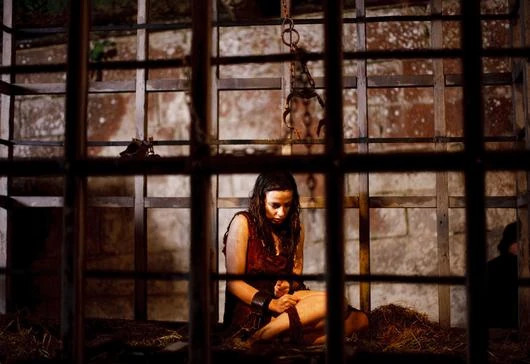
Despite Gaius's warnings not to interfere and against a background of a stormy night (INTERNAL CONFLICT) Merlin openly uses magic (QUEERNESS) in-front of Freya to reassure her that he is there to help and frees her, before narrowly escaping Halig.
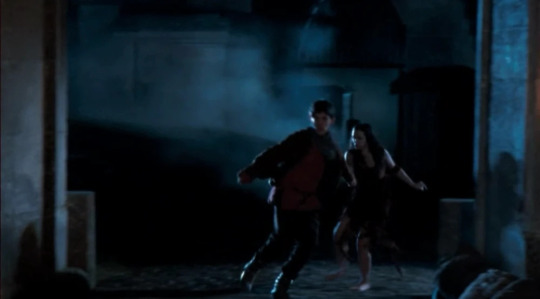
Merlin hides the girl in the catacombs (THE PLACE THE OVERWROUGHT SUBCONSCIOUS MIND BURIES ALL OF THE PROBLEMS AND SECRETS ) beneath Camelot (SOCIETY) and promises to look after her.
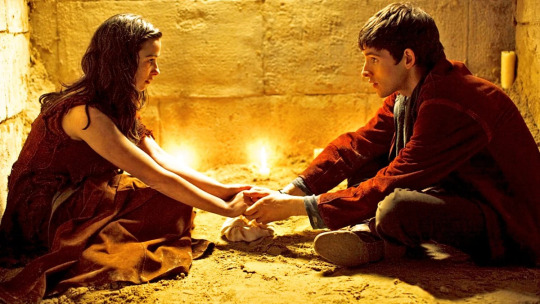
She asks Merlin why he saved her and he says it could have easily been him in the cage (BOTH MERLIN AND FREYA ARE MAGICAL CREATURES LIVING IN A SOCIETY THAT CONDEMNS THEM FOR WHO THEY ARE)
Halig goes to Uther and notifies him of Freya's escape with the help of an accomplice. Uther assigns a detachment of guards to capture them.

The next 30 minutes of the episode becomes the main core of my analysis.
_____________________________________________________________
Merlin performing domestic duties for Arthur:
IN THE PATRIARCHIAL WORLD OF UTHER'S CAMELOT, MERLIN PERFORMS TASKS WHICH ARE CONSIDERED FEMININE.
MERLIN PREPARES AND SERVES ARTHUR FOOD.
MERLIN PREPARES ARTHUR'S BATH.
MERLIN CLEANS ARTHUR'S CLOTHES AND SHOES.
MERLIN FUSSES OVER ARTHURS WEIGHT AND APPEARANCE.
ALL WHICH HE DOES EVERYDAY FOR WHICH HE IS NEVER APPRECIATED OR THANKED.
SOUNDS LIKE A COMPLAINT A LOT OF WIVES HAVE.
_____________________________________________________________
Arthur views Merlin as feminine and lacking masculine traits:
ARTHUR SEES MERLIN CARRYING A BLACK DRESS AND ASSUMES IT IS FOR MERLIN HIMSELF
youtube
_____________________________________________________________
Merlin steals food from Arthur to give it to Freya:
youtube
FOOD AND SEX HAVE BEEN ASSOCIATED FROM ANTIQUITY.
EVEN MODERN STUDIES HAVE CONFIRMED THE STRONG CONNECTION BETWEEN SEX AND FOOD.
SOURCE: https://www.researchgate.net/figure/Correlations-between-sex-and-eating-variables_tbl1_290219210
JUDEO-CHRISTIANITY SEES GLUTTONY AND LUST AS INTERCHANGEABLE, BOTH SINS OF THE FLESH.
IN MEDIEVAL TIMES, AN UNFAITHFUL WIFE WAS OFTEN ACCUSED OF HIDING FOOD FROM HER HUSBAND ONLY TO GIVE IT TO HER LOVER (MAKING HER ADULTERY AN ECONOMIC PROBLEM AS WELL).
USING THE CONTEXT ABOVE, IT IS QUITE FUNNY TO SEE HOW MERLIN STEALS FLESH (MEAT) FROM ARTHUR TO GIVE IT TO FREYA.
_____________________________________________________________
Freya reveals to Merlin that she is cursed:
HERE THE CURSE THAT FREYA IS TALKING ABOUT IS HER BEING A TRANSGENDER PERSON.
THERE ARE FEW BETTER SYMBOLS FOR SOMEONE GOING THROUGH THE PROCESS OF FEMALE-TO-MALE TRANSITION THAN THE HUMAN TO CREATURE TRANSFORMATION TROPE.
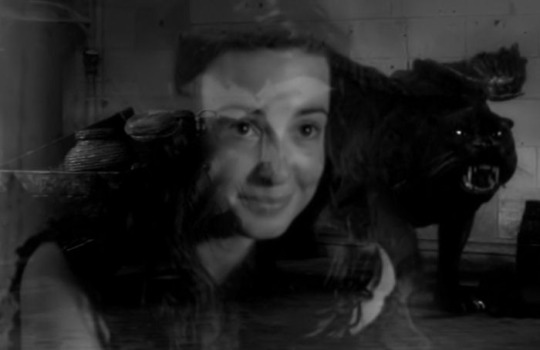
WHEN YOU ARE ON HRT TESTOSTERONE THERAPY, MOST PEOPLE BECOME HAIRIER AND STRONGER AND GAIN MUSCLE, WHICH IS VERY SIMILAR TO THE BASTET CREATURE TRANSFORMATION BY FREYA.
PLEASE NOTE, I AM NOT SAYING THAT TRANSGENDER PEOPLE ARE CURSED. I AM SIMPLY SAYING IT CAN FEEL LIKE A CURSE CONSIDERING THE BIGOTRY AND HATE TRANSGENDER PEOPLE FACE.
______________________________________________________________
Freya and Merlin profess their love for each other and kiss.

Against this background, Halig is narrowing in on Freya's hideout.
Freya decides to escape Camelot, believing that Merlin is better off without her. She is then confronted by Arthur, Halig and a group of knights.
Arthur manages to badly wound Freya in her Bastet form before being distracted by a gargoyle which was toppled by Merlin.( IT IS A REAL COINCIDENCE THAT ARTHUR ATTACKS FREYA WHO HAD KISSED MERLIN A FEW MOMENTS AGO, SIMILARLY TO HOW ARTHUR WOULD ATTACK LANCELOT FOR KISSING GWEN IN SEASON 4 EPISODE 9)
Merlin runs after Freya to find her mortally wounded. (IT IS THE OBJECT OF MERLIN’S HOMOSEXUAL DESIRES (ARTHUR) WHO KILLS THE OBJECT OF HIS HETEROSEXUAL DESIRE (FREYA) )
A heartbroken Merlin places her body on a boat and uses his magic to give her a traditional funeral by the lake. (I THOUGHT IT WAS VERY POIGNANT IN HINDSIGHT BECAUSE ONCE FREYA DIES AND BECOMES LADY OF THE LAKE THESE TWO NEVER SHARE A ROMANTIC RELATIONSHIP AGAIN. SHE IS LITERALLY SUBMERGED INTO THE LAKE WHICH IS A METPHAPHOR FOR MERLIN’S CONCIOUSNESS. LOCKED AWAY FOREVER)
Back at Camelot, Arthur aware that Merlin is upset helps cheer him up before delegating him more tasks. (MERLIN'S HOMOSEXUALITY HAS FINALLY WON OUT AND HE HAS ACCEPTED HIS DESTINY I.E ARTHUR ROFLMAO. PRIOR TO THIS EPISODE MERLIN DID SHOW HINTS OF ATTRACTION TOWARDS THE OPPOSITE SEX. THIS IS EVIDENCED BY HIM ADMIRING MORGANA IN SEASON 1 EPISODE 1 AND NIMUEH IN SEASON 1 EPISODE 4. HOWEVER FROM THIS EPISODE ON, MERLIN SHOWS NO ATTRACTION TO ANY FEMALE CHARACTER WHAT SO EVER. THIS IS EXPRESSED EXPLICITLY IN SEASON 4 EPISODE 8 WHERE THE LAMIA SEEMS TO BE ABLE TO ENCHANT ALL THE MEN EXCEPT MERLIN. GWEN EVEN ASKS WHY EVERY MAN EXCEPT MERLIN HAS BEEN ENCHANTED.)
I TRULY ENJOYED THIS EPISODE AS IT IS RIFE WITH SYMBOLISM FOR ME TO PICK APART AND ANALYZE !
#arthur pendragon#bradley james#merlin bbc#merthur#colin morgan#queer coding#gay subtext#merlincersei#lgbtqia shows#FREYA#freylin#merlin meta#Youtube
70 notes
·
View notes
Text
Collaborative Masterpost on Saint-Just
Primary Sources
Oeuvres complètes available online: Volume 1 and Volume 2
A few speeches
L'esprit de la révolution et de la constitution de la France (1791)
Transcription of the Fragments sur les institutions républicaines (1800) kept at the BNF by Pierre Palpant
Alain Liénard's edition and transcription of his works in Théorie politique (1976)
Some letters kept in Papiers inédits trouvés chez Robespierre, Saint-Just, Payan, etc. (1828)
Fragment autographe des Institutions républicaines
Une lettre autographe signée de Saint-Just, L. B. Guyton et Gillet (not his writing but still interesting)
Two files at the BNF with his writing (and other strange random stuff):
Notes et fragments autographes - NAF 24136
Fragments de manuscrits autographes, avec pièces annexes provenant de Bertrand Barère, de V. Expert et d'H. Carnot - NAF 24158
Albert Soboul's transcription of the Institutions républicaines + explanation of what's in these files at the BNF
Anne Quenneday's philological note on the manuscript by Saint Just, wrongly entitled De la Nature (NAF 12947)
Masterpost (inventory, anecdotes, etc.) - by obscurehistoricalinterests
Chronology
Chronology from Bernard Vinot's biography
Testimonies
Élisabeth Duplay-Le Bas on Saint-Just, as reported by David d'Angers - by frevandrest and robespapier
Élisabeth Duplay-Le Bas corrects Alphonse de Lamartine’s Histoire des girondins (1847) - by anotherhumaninthisworld
Many testimonies by contemporaries (in French) on antoine-saint-just.fr
Representations
Everything Wrong with Saint-Just's Introductory Scene in La Révolution française (1989) - by frevandrest
On Saint-Just's strange representation of "throwing tantrums" - by saintjustitude and frevandrest
Saint-Just as "goth/emo boy"? - by needsmoreresearch, frevandrest and sieclesetcieux
Recommended Articles
Bernard Vinot:
"La révolution au village, avec Saint-Just, d'après le registre des délibérations communales de Blérancourt", Annales historiques de la Révolution française, No. 335, Janvier-Mars 2004, p. 97-110
Alexis Philonenko:
"Réflexions sur Saint-Just et l'existence légendaire", Revue de Métaphysique et de Morale, 77e Année, No. 3, Juillet-Septembre 1972, p. 339-355
Miguel Abensour:
"Saint-Just, Les paradoxes de l'héroïsme révolutionnaire", Esprit, No. 147 (2), Février 1989, p. 60-81
"Saint-Just and the Problem of Heroism in the French Revolution", Social Research, Vol. 56, No. 1, "The French Revolution and the Birth of Modernity", Spring 1989, p. 187-211
"La philosophie politique de Saint-Just: Problématique et cadres sociaux". Annales historiques de la Révolution française, 38e Année, No. 183, Janvier-Mars 1966, p. 1-32. (première partie)
"La philosophie politique de Saint-Just: Problématique et cadres sociaux", Annales historiques de la Révolution française, 38e Année, No. 185, Juillet-Septembre 1966, p. 341-358 (suite et fin)
Louise Ampilova-Tuil, Catherine Gosselin et Anne Quennedey:
"La bibliothèque de Saint-Just: catalogue et essai d'interprétation critique", Annales historiques de la Révolution française, No. 379, Janvier-mars 2015, p. 203-222
Jean-Pierre Gross:
"Saint-Just en mission. La naissance d'un mythe", Annales historiques de la Révolution française, Année 1968, no. 191 p. 27-59
Marie-Christine Bacquès:
"Le double mythe de Saint-Just à travers ses mises en scène", Siècles, no. 23, 2006, p. 9-30
Marisa Linton:
"The man of virtue: the role of antiquity in the political trajectory of L. A. Saint-Just", French History, Volume 24, Issue 3, September 2010, p. 393–419
Misc
Saint-Just in Five Sentences - by sieclesetcieux
On Saint-Just's Personality: An Introduction - by sieclesetcieux
Pictures of Saint-Just's former school, with the original gate - by obscurehistoricalinterests
Saint-Just vs Desmoulins (the letter to d'Aubigny and other details) - by frevandrest
Saint-Just's sisters - by frevandrest
On Thérèse Gellé and Henriette Le Bas - by frevandrest
Saint-Just and Gellé being godparents - by frevandrest and robespapier
On Saint-Just "stealing" and running away to Paris and the correction house - by frevandrest and sieclesetcieux
How was/is Saint-Just pronounced - Additional commentary in French by Anne Quenneday
#saint-just#antoine saint just#saint just#to be updated#masterpost#refs#sources#frev sources#testimonials and commentaries
112 notes
·
View notes
Note
You had us compile Leitners for you... and Jurgen Leitner's fucked up library is filling nicely. What about Mikaele Salesa's fucked up Antiques? We only know a few of them. You got any ideas on some new ones for his collection of problems?
(Also, you got Salesa and Leitner designs?)
A thin 1800's monocle - when worn the wearer is forced to witness horrific events that had happened to anyone they look at. Tied to the Eye.
A twisting hourglass - an hourglass with a highly unusual design, time seems to lose meaning for the person who turns the glass until the sand runs out. Tied to the Spiral.
A broken lantern - while the lantern can't actually be used, it seems to steal the light from other sources shrouding it's surroundings in immense darkness. Tied to the Dark.
And I have some ideas for them but nothing sketched out.
119 notes
·
View notes
Text
By popular demand!
Villain Introduction: Vermir Nadvalsib, the Mage Eater
“I don’t think you know the opportunity that’s being given to you, girl,” Vermir addressed. “I’m working towards a better world, ruled by gods who know what it’s like to be mortal. There will be no disease, no hunger, no tyrants…. Or no selfish ones, at least. It’s going to take a strong hand to bring this about, and that hand needs fingers to work with. I’m offering you a place at my side.”
Fana looked down at the woman’s outstretched eikodoro hand and spat in it. The girl’s tawny eyes flashed as they caught the pale light of Vermir’s runes.
“You’re one of those crazy book mages, aren’t you?” She barked a laugh. “Go fuck yourself. My father will be here soon and you’d better pray it’s him who gets here first, because if Aunt Tw—”
Fana’s threats broke off with a sucking gasp as Vermir’s dagger found her heart. All at once, reality stilled the girl’s fiery tongue. It was shocking—bad things could happen, even if your family had all the power in the world.
Gently, Vermir laid the spasming girl down, Twelve and Ten stepping to the side. “Don’t worry, sweet Fana, this’ll be over soon,” she whispered. “You’re going to become something great. You’ll be the newest of a new order. You’ll save the world.”
Blood coated the girl’s teeth as she stared up at the silver faceplate that would be the last thing those eyes would ever see. Vermir kept one ocular rune on her arcane signature—a swirl of molten, particolored glass. It faded, growing dimmer and dimmer as the life leaked from her breast.
“I’ll k— kill you,” Fana breathed, eyes wide and glassy. “My family… save me….”
Vermir saw the exact moment little Fana Devaris died. To her magical senses, it seemed as if the girl’s arcane signature exploded, a million glowing particles spitting out like sparks from a forge.
From her pocket, the mage drew a vial of black ichor. The spirit blood was the key—the biocomponent—that allowed her to suck magic from a sorcerer, just as that sorcerer’s blood was the biocomponent that allowed some fragment of their mind to survive in a metallic body.
"This will all be over soon," Vermir whispered, though the girl could hear her no longer. "This will be over and, oh sweet thing, you'll be something better."
Spoilers for Mystery of the Mortal God below
Vermir Nadvalsib was born on the Janazi island of Laben, about five hundred years before the plot of The Mystery of the Mortal God takes place. She lived there peacefully, serving as their village mage. It was a good life, and she loved her community like nothing else, treating their sickness and improving their infrastructure. Unfortunately, there eventually came one problem she couldn't fix.
Aderin flu is all but eradicated in modern-day Janaz. However, five hundred years ago, it killed islanders by the thousands. When the disease came to Laben, Vermir worked tirelessly to find a cure. She was never successful. In time, she felt the claws of the disease curl around her lungs as well, and so she turned to darker sources. She just needed more time to work out a cure. She just needed the right magic.
Vermir knew that Chosen, those blessed by the gods and given the power to work miracles, were capable of healing the sick. She also knew that no god has more than one Chosen, and that all the Illarian gods were taken. So, she sought this power from an alternative source.
In an ancient Araunian tablet passed down to her by her predecessor, Vermir read about a spirit of antiquity, feared by the long-dead desert people. They called it only the 'dark beyond.' Vermir thought she would be able to ask this old god to make her its Chosen, and thus use its power to make herself immortal so she'd have the time to make a cure to save her people.
Unfortunately, the being she called upon was no god.
End, though Vermir never learned its name, tore through Laben out of the portal she opened. It devoured the divine souls of the townsfolk and grafted their echoes onto Vermir before the ritual failed and it was pulled back into outer space. This rendered her semi-immortal and nearly broke her mind. The whispers of the people she inadvertently killed hiss through her skull in a constant murmur.
The Chosen of the Illarian church, deployed because of the End influx, found her all but comatose. The power flowing through her was too raw at the time for the Chosen to kill her, so they tossed her in the Trench. She didn't need air anymore, after all.
For five hundred years, she languished in the ocean floor prison. She came to blame the gods for her failed ritual. Why had they sent the Aderin flu if they cared for mortality at all? Why had the Chosen come to arrest her, but not to cure her people? Why was there cruelty in the world at all if the gods could prevent it?
Her hate calcified into a grand plan. First, Vermir would find herself a perfect, unkillable form, finally finishing her trip towards immortality. Second, she would find a way to steal sorcery and give herself a godly amount of power. To do all this, she would capture a spirit and use its divine knowledge and alchemically powerful ichor to fuel her plans. It took her many centuries to work all of this out.
She escaped the Trench by causing a magic blackout, using the tooth of a 'beast blessed by the dark beyond' she managed to find in there. (Not that Vermir would know, but that tooth would be none other than Izjik Meautammera's, which she lost by hitting her head on a rock) (The magic blackout she caused also allowed Sepo and Izjik to escape). She waited until the gods sent a spirit to investigate the surge of strange magic, then captured that spirit and pulled it into a mobile demiplane she spent her time in the Trench constructing.
After that, she just needed to find some sorcerers whose magic she could steal, and who she could put into robotic bodies as a test run for her own perfect form. It's just a little unfortunate for her that the sixth experimental subject she chose was a little more... willful than the others.
And the rest is history!
As a person, Vermir really believes that usurping the gods to rule in their stead is the right thing to do. She thinks that mortals deserve to be ruled by a mortal, and once her utopian empire is solidified and all disease and war are eradicated, she really does intend to step down to let people rule themselves. The one thing that she doesn't care about is how many people she needs to kill to get to this point. A mass slaughter of sorcerers is just the price that must be paid to give her the power to save the rest of the world. She's giving those sorcerers immortality, after all, in the form of metal bodies. Why should they be upset?
Her main weakness is her temper. Vermir likes to see herself as above such petty things, but when someone pushes her buttons, she loses her cool incredibly fast. This makes her sloppy.
Her main strength is that she's a legitimately good god-queen. At the current point in the story, she's taken over a city and executed its ruler. The people love her because she distributes food fairly, runs a judicial system that cares about more than money, gives free medicine to the sick, and provided heating runes to defend against the frigid climate to an extent that the old regime never did. Apart from her transfer for sorcerers into brainwashed metal bodies and stealing of their magic, all of which she keeps secret from the masses, she's an incredibly benevolent tyrant.
As for what she looks like, as she first appears, Vermir is a shriveled bog mummy of a woman. Her face is leathery and she has no hair. Her brown eyes are adjusted to the Trench's darkness. Later, she finds herself in a towering metal form made of pale silver eikodoro - the siren god-metal. No matter if she wears flesh or metal, Vermir is wreathed by a cowl of shadows, which are the chattering remnants of Laben's populous. She doesn't have the heart to get rid of the last echo of her people, no matter how annoying they might get.
Now for fun facts, I guess?
Vermir, for all the grief she's caused him, doesn't know Mashal's name. She just calls him Six, because he was her sixth subject.
She has some serious beef with Astra because the witch stole her notes, even though she sees a lot of herself in the younger woman.
Her first round of experiments (One through Seven) were done to perfect the transfer process of putting a mind in a metal body. The rest of the sorcerers she kills and stuffs into metal bodies are brainwashed into serving as her soldiers.
At this point in the story, after conquering a city known for its sorcerous university, she has the power of upwards of 15,000 sorcerers at her disposal. This would make her more powerful in sheer destructive capabilities than many minor spirits.
She has canonically used the words "ran through" to describe a library.
I imagine her with a New Jersey accent because it's funny.
She intends to find a way to put her metal soldiers back into fleshy bodies should they want it once her conquestest of the world and usurpation of the gods is over.
Frankly, Vermir is one of my favorite villains because she just has so much personality. Also, if someone showed up, killed the president on live TV, then declared that they were the predisent now and healthcare, food, and rent were now free, I'd probably get behind them too if that's all I knew. Lmk if you have any questions and I hope you enjoy my cunty little Glados ripoff <3
Have a bitchin day!
@amandacanwrite @elsie-writes @riveriafalll @kosmic-kore @kaylinalexanderbooks @bard-coded @carrotsinnovember @patternwelded-quill @somethingclevermahogony @whatwewrotepodcast @goldxdarkness @the-angriest-author @mk-writes-stuff @frostedlemonwriter @vyuntspakhkite-l-darling
17 notes
·
View notes
Text
Crossposting from Twxttxr: some interesting news about ongoing research by colleagues, from a workshop "Diversification of Uralic" just this Thursday and Friday
Do the Permic languages have loanwords from Old Norse? e.g. ONo. ár ~ Komi & Udmurt ar 'year'. This would've been sensible during the brief time when Norsemen originally from Sweden were in charge of trade along the Volga and settling in inner Russia, forming the Rus' (later Slavicized, but as we know from Byzantine sources they remained Norse for centuries) — and also the Norwegians too were known to conduct exploration + trade along the Barents Sea at the time, our oldest written reports of "Bjarmia" come from them after all.
Do the Finnic languages have loanwords already from Pre-Proto-Germanic into Pre-Proto-Finnic? My first reply would've been "yes surely", this has been discussed for half a century and there's dozens of etymologies out by now. Turns out though that there's still a lot of room for skepticism if we try to assemble a big picture. Most of these could be (and have been proposed by other analyses) to be proper Germanic after all, or from some non-Germanic kind of Indo-European, or even incorrect. There is unambiguous evidence I think at least of loans lacking *ā > *ō, but that's already though to be one of the latest common Germanic innovations, perhaps barely post-PG.
[Follow-up question: do we even know where Pre-Proto-Germanic was spoken? might not have been anywhere convenient for contacts with Pre-Proto-Finnic.]
— A few similar problems also in the less discussed supposed layer of Proto-Balto-Slavic or pre-BSl. loans, but by areal considerations it seems obvious to me there must've been Uralic/IE contact somewhere in the Russian forest belt for ages already, even if it might not have left enough evidence to clearly distinguish from things like pre-Indo-Iranian loans.
Do the Samic languages have loanwords that are not from any historically attested branch of Scandinavian, but some sort of a lost variety entirely? This could be an explanation for an unexpected sound correspondence *j → *ć in many loans; it might also explain some loans that look surprizingly archaic, e.g. lacking any reflection of Siever's Law. One example showing both is indeed *Tāńćə 'Norse', from some sort of a *Danji- variant of Proto-Germanic *Daniz.
Several new hypotheses on the history of of sibilants in Ugric, adding to the growing tally of evidence that traditionally reconstructed *s > *θ and *ś > *s "in Proto-Ugric" are actually later developments. A paper supposed to be coming out soon!
No linguistic evidence so far, but a 1670 travelogue by de La Martinière appears to still report seemingly pre-Uralic populations along the Barents Sea coast — and even on Novaya Zemlya, traditionally thought to have been uninhabited (as reported by other early modern explorers) before some Tundra Nenets briefly settled there in mid 19th century. Apparently there's been no real archeological investigation, but also at least two stone labyrinths are known as signs that humans still must've at least visited there sometime in the past.
[By current knowledge, labyrinths from Sweden and Finland have mostly been built in late medieval and early modern times though, so they don't suggest especial antiquity either. Could the ones on NZ in fact have been left behind by some of these historical Northwest European expeditions?]
Various discussion also on the development of Samoyedic. Nothing particularly all-new (maybe on Nganasan, more on that in a PhD thesis to appear later this year though), but a few main results include 1. clear recognition that there is no "North Samoyedic" group (as has been suspected for several years now), 2. confirmation that there is regardless a narrower Nenets–Enets group, and 3. some development of a model where all three of Nenets, Enets and Nganasan may have moved to the tundra zone independently from further down south (as is certainly the case for Northern Selkup, the most recent northern expansion of Samoyedic speakers).
#historical linguistics#loanwords#language contact#archeology#ethnohistory#uralic#finnic#samic#permic#samoyedic#germanic
28 notes
·
View notes
Text
Keith & Nicole's Shaky Start

Country singer Keith Urban and actress Nicole Kidman will celebrate their 18th wedding anniversary next month. They have for many years been the image of the stable, happy celebrity couple who have figured out how to balance their personal and professional lives. They both have active careers, but they shower each other with support and don't seem beleaguered by the pressures of public expectations, nor do they seem to suffer from lack of time together.
It's easy to forget that in late 2006, just four months after their wedding, they faced a turning point in their relationship when Nicole staged an intervention to get Keith to enter rehab. Those few months where he was in rehab were accompanied by a slew of tabloid stories featuring one main source - a woman from Nashville who claimed that Keith had cheated on Nicole with her during his downward spiral.
Before they became a prime example of a Hollywood relationship that actually lasts, they had to overcome what Keith called "the implosion of my fresh marriage."
2005
January 2005
Fellow Australians Nicole and Keith meet at the G'Day USA gala on January 15, 2005, in Los Angeles.
Nicole was about four years removed from her divorce from Tom Cruise. After their split, she'd also had an under-the-radar romance with Lenny Kravitz, revealing years later that they had actually been secretly engaged.
For his part, Keith had dated a veterinarian technician named Laura Sigler for about eight years after moving to Nashville in the early 90s as he tried to begin his country music career. (Rare pictures from Keith's relationship with Laura during the mid-90s were published here in the Daily Mail years later.)
Some sources report he and Laura were engaged, but it didn't last. He then dated model Niki Taylor from 2002 to 2004.
By the time he met Nicole, Keith had already been to rehab twice for substance abuse issues, with the first trip taking place in 1998. He finally got his first real taste of success in country music in 1999.
Though Nicole revealed she instantly liked Keith and gave him her phone number, he took four months to call her.
July 2005
Keith and Nicole are spotted out together, but her rep initially denies they are dating, stating that they are "just friends."
November 2005
Though they still haven't confirmed their relationship, Keith and Nicole have been seen together many times over the previous months. They reportedly bring their parents all together in Nashville to celebrate Thanksgiving, according to the New York Daily News. Star magazine also gets pictures of them walking arm in arm, and they are seen out antiquing with their families.
Nicole is spotted with a ring on her finger that sparks engagement speculation. At the time, Urban’s rep says, “Right now it’s just a rumor.”
December 2005
Keith and Nicole are photographed walking together in Nashville on Christmas Day.
Four days later, Keith’s ex-girlfriend snipes to The Sun about Nicole and Keith, taking some shots alluding to his previous addiction issues.
An old flame of the country singer calls him a former cocaine addict with commitment problems.
“Nicole and Keith might date for a while – but it won’t last very long,” Laura Sigler tells the London newspaper the Sun, MSNBC reports. “I don’t know her, but I know him very well.”
She continues, “There were a lot of lows with the drugs. I don’t have any dark past – he was probably the darkest part, but I’m on my own now, and I’m happy about that.”
Keith’s first manager from early in his career also expresses his doubts.
Gary Shaw, Urban’s first manager, also doesn’t think Nicole has a future with the country music star.
“I’ll be very surprised if the relationship lasts,” said Shaw. “He is in it for the chase. He likes to go after what he wants and if he can’t have it, he wants it even more.” (Source)
2006
February 2006
They make their first official public appearance together when Nicole goes with Keith to the Grammys. He wins for best male country vocal performance.
May 2006
Nicole confirms she and Keith are engaged.


June 2006
Just a month after confirming their engagement, the two get married on June 25, 2006, in their native Australia.
July 2006
Fresh off their honeymoon in Bora Bora, Nicole and Keith are back in Nashville and celebrate the 4th of July watching fireworks. Pictures of them at a party at Buffalo Billiards are printed in The Tennessean.
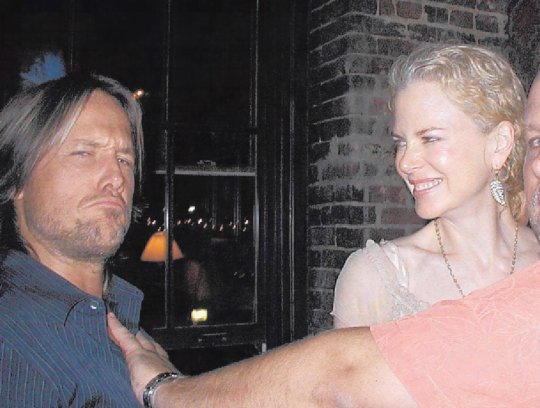
September 2006
Nicole denies rumors that she is pregnant.
October 2006
On October 13, 2006, Nicole attends the premiere of her film "Fur" at the Rome Film Festival in Italy, without Keith.
On October 20, 2006, Keith releases a statement that he is entering rehab again, less than four months after their wedding.
Grammy-winning country singer Keith Urban has checked himself into a rehabilitation treatment center for alcohol abuse — less than four months after his marriage to actress Nicole Kidman.
Urban released a statement Friday that said he entered rehab Thursday night with his wife by his side. His publicist would not give the location of the rehab center.
"I deeply regret the hurt this has caused Nicole and the ones that love and support me," Urban said in the statement.
Urban, who turns 39 on Oct. 26, has publicly acknowledged a former addiction to cocaine, but his publicist said Urban was currently being treated for alcohol abuse.
"One can never let one's guard down on recovery, and I'm afraid that I have," the statement reads. "With the strength and unwavering support I am blessed to have from my wife, family and friends, I am determined and resolved to a positive outcome."
He will later say that Nicole staged an intervention to get him to go to rehab, flying home from overseas to ask him to get help.
"I went off the rails," Keith said. "I hadn't conceded to myself that I needed help and a new direction in my life."
When Nicole learned about Keith's bender, she booked a flight back to the States and reached out to some of Keith's closest friends and allies, mostly from Nashville, and arranged an intervention. Soon enough, Keith was sitting in a room surrounded by his wife and a group of people who genuinely cared for him. "The love in that room in that moment was just right," Keith told Oprah Winfrey. "To see love in action in that way ... I'd never experienced anything like that before."
Keith had a show booked at the Mohegan Sun Casino in upstate Connecticut, but rather than plugging in and playing, he packed his bags and checked into the Betty Ford Center at Rancho Mirage, California, on October 19. (Fellow rehab-er Tommy Emmanuel said that Betty Ford was right for Keith. He believed it had a "really good, solid programme".)
As Keith described it, "The night I went in, it was total surrender." His mantra — which sounded a lot like one of his lyrics — was "Let's do it and let's do it right this time."
Keith even left behind his guitar, as he had done during his time at another rehab centre, Cumberland Heights. It was a massive sacrifice for such an obsessed musician. But part of his rehab was the need to discover who he was away from music, which had defined him pretty much all his life. As Keith would tell a reporter, "I had to find out, 'What am I doing and why do I do it?"' (Source)


His trip to rehab is big news, and while more careful publications like People approach the topic with somber tones, other tabloid stories will start to ramp up, beginning with claims about Keith's behavior at a Nashville bar in October while Nicole was away.
According to one report:
Country crooner Keith Urban is in rehab battling his demons, and one of them appears to be named Amanda Wyatt. Life & Style quotes two witnesses who watched Urban drunkenly hook up with the model on Oct. 6 at a bar in Nashville.
Says an unnamed witness: “I watched them kiss for 20 minutes straight.”
Adds another: “It was almost like, ‘Get a room!’ … I don’t think they knew what they were doing, they were so out of it.” (Chicago Tribune)
November 2006
Nicole is seen visiting Keith at the rehabiliation facillty.
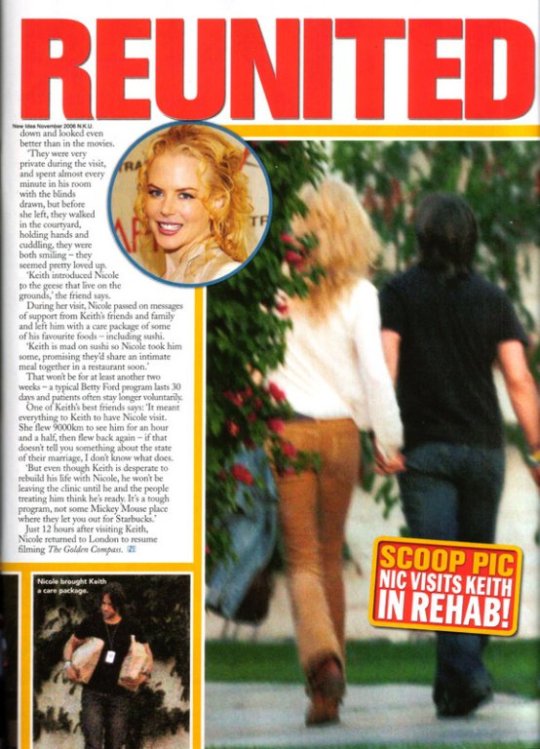
December 2006
At the end of December, Amanda Wyatt, the subject of that Life & Style story, gives an in-depth interview and claims Keith cheated on Nicole with her during their engagement. The link provides a much longer story, but here are some excerpts according to that article:
"I feel sorry for Nicole. Keith cheated on her repeatedly with me, right up to just before they got married,'' Wyatt says. "He's done it once, and he'll probably do it again.
"I know him as well as anyone, and while he can be charming and loving, he is also someone who is constantly fighting his demons.
"I hope their marriage works - but leopards don't change their spots. Keith is a great guy who has everything, but he is never truly happy.''
"I tried not to fall in love with him, but we were together throughout the whole time he was dating Nicole and engaged to her, right through 2005 and until around May, 2006.
"Looking back, maybe he came to Nashville and partied with me because he could do things with me he couldn't do with Nicole.
"He has his demons. I'm sure she didn't know about his drug use but it was so obvious when he was with me. Maybe he kept it hidden from her."
"Then, around May, he suddenly turned cold and stopped calling and replying to my texts.
"They got married in June.''
Wyatt says she last saw Urban in October - a meeting she is reluctant to discuss.
But a US magazine reported that Wyatt and Urban had been seen kissing and cuddling in a Nashville bar while Kidman was at the Rome film festival.
A witness was quoted as saying: "They were all over each other kissing and touching. It was like: Get a room!''
At the time, Urban's Los Angeles publicist dismissed the story as a fabrication. But within days, the country singer had checked himself into rehab.
One note about that - the Life & Style story said witnesses saw Keith and Amanda together on October 6, and Nicole was at the Rome Film Festival October 13, so there is a discrepancy there.


Wyatt is also quoted in The New York Post on December 27, 2006.
Wyatt said Urban continued to bombard her with sexually charged text messages even as things got hotter between him and Kidman.
“He would text me when he wanted to see me. Every now and then, he would call me to see how I was doing,” she said. “I would say half the texts he sent me, from the time he was linked to Nicole to the day he got married, were sexual.”
Meanwhile, on December 28, 2006, Keith is seen with Nicole while on a break from rehab.
Keith Urban has reunited with wife Nicole Kidman in Sydney, Australia, where she spent Christmas. But lest you're wondering, he's not out of rehab just yet. In response to a query by the Associated Press, his publicist, Paul Freundlich, said in an e-mail: "Keith is on a leave in Australia to be with his family during the holidays. This is a natural occurrence at this point in his treatment. He will continue with his rehab upon his return."
Urban, 39, who has had drug and alcohol problems, checked himself into a center in October, with Kidman by his side. He flew into Sydney on Tuesday, the Australian Associated Press reported. Cameras caught Kidman, also 39, and Urban holding hands as they left the United International Pictures office Wednesday.
The Aussie-raised couple said nothing to the media as they walked to a car and were driven away. We could assume they were not responding to questions about a report over the Christmas weekend that Urban had an alcohol- and drug-fueled affair with a lingerie and catalog model named Amanda Wyatt, 23, right up until he married Kidman in June. The source of the story in the Daily Mail of London: Wyatt. (Source)
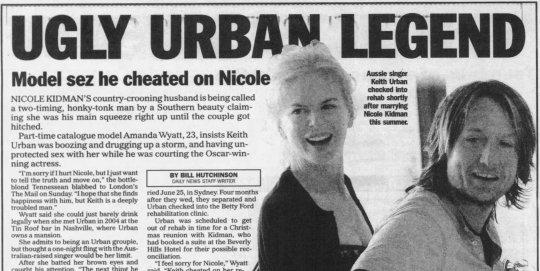
There is some doubt cast on Amanda's story - some articles examine Keith's tattoos in pictures of him with Amanda meant to prove their affair, and speculate that the photos were taken before Keith ever met Nicole, because of the fact that he had subsequently gotten one of them covered up.
According to the Associated Press: "An Urban spokesman says it's all fiction."
2007
January 2007
Keith completes his stint in rehab and his publicist announces that he will be going back on tour in April.
In late January, he posts a mesage to fans on his website, stating that he initially planned only to stay in rehab for 30 days but realized it would be best for him to complete a 90-day treatment.
The 39-year-old country singer, who has publicly acknowledged a former addiction to cocaine, said he decided to stay for three months because he realized that learning to abstain was only part of the process to recovery.
“Learning about abstinence was one thing, but then there was all this other area of my life to start learning about, and so 30 days became 60, and 60 days became 90, and with each week that passed I found myself really learning how to surrender,” he said.
“There was no big cataclysmic event that happened right before I went in,” Urban said. “It was a lot of small things that were happening in my life, a lot of small moments that were starting to accumulate that were telling me very loud and clear that I was a long way from my program of recovery, and they were making my life unmanageable.” (Source)
February 2007
According to an archived article from defunct website "The National Ledger," supposedly Wyatt apologized to Keith and Nicole via WKRN Nashville. I can't find the original story from WKRN anywhere, and no other outlets reported on this that I can locate, so I'm unsure how legit it is because this seems like it was a site for amateur writers. But if it is true, this is supposedly what she said to the TV station:
A report from WKRN of Nashville now says that Wyatt wants to apologize. Wyatt said that since her story came out, Urban's people have contacted her, and now she just wants to move on. She said, "I apologize to everybody I hurt. I'm trying to move on with my life and career at this point."
Amanda Wyatt claims the tabloids approached her about running a story on her relationship with Keith Urban, not the other way around. Wyatt thought if she shared her side, it would set the record straight. Now, she said that's not what happened.
A report on the TV stations website notes Wyatt's life turned upside down after the tabloid published details of her relationship with Urban. Wyatt told News 2 in an exclusive interview that most of the print about her is inaccurate.
She said, "Everything out there has been fabricated and not much of it is accurate."
November 2007

A year after rehab, Keith covers People Magazine, praising Nicole for getting him through his tough time.
Last October your life seemed perfect – yet it was at that moment that you re-entered rehab. Why?
I was going to lose it all. It was like, “If I don’t choose this moment to do the right thing and do something that’s going to give me life, all of the things I’m scared of losing, I’m going to lose anyway.”
I knew very well right then that this is actually going to be the best, strongest road to get me back to the two things I love, which are my home life and my career, and finding the balance in those two. I need them both…”
Both you and Nicole have said it made your marriage stronger.
Oh God, yeah. Some of these things happen in marriages many, many years into it, and you work through them. It’s like moving into a house, and the house burns down; we get to build a new one together.
Nicole listened to her heart and did what she felt was the right thing to do. To see that kind of love in action, that’s very moving and deeply inspiring and just makes me want to be a better man.
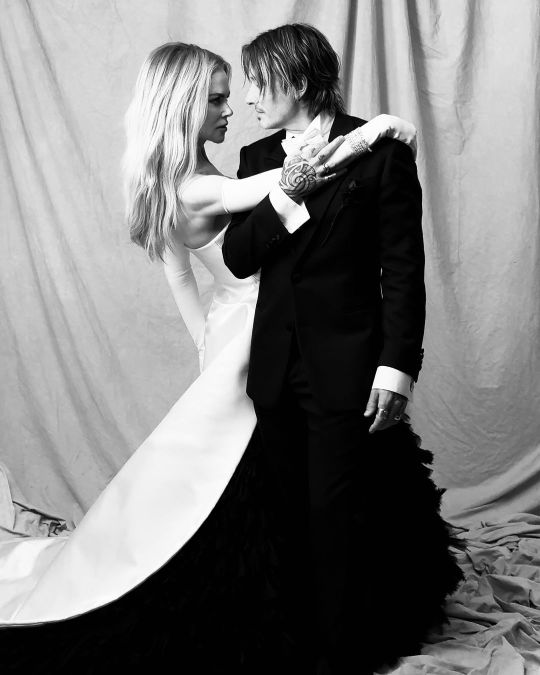
Keith and Nicole went on to have two daughters together in 2008 and 2010. Keith has talked about this tumultuous period in his life and their marriage several times over the years.
“I was very, very blessed to have Nic call an intervention on me. I had a tight group of friends around me for the intervention," Urban told Rolling Stone in June 2014. "I didn't give a s—t about anything except turning a corner in my life and doing whatever it took for that. And off I went.”
“I caused the implosion of my fresh marriage,” he recalled to Rolling Stone in June 2016. “It survived, but it’s a miracle it did. I was spiritually awoken with her. I use the expression ‘I was born into her,’ and that’s how I feel. And for the first time in my life, I could shake off the shackles of addiction.”
Though Keith has given Nicole much credit for getting him through that time, she has said the lesson she learned was that ultimately, it was all up to him to help himself.
Kidman told PEOPLE and Entertainment Weekly‘s editorial director that she would advise the loved ones of an addict “to get help. To put your hand up, to reach out. There is absolutely help out there. You can’t save somebody, they’ve got to save themselves.”
That lesson, she explains, “is a very big thing for people like me who go, ‘I can take care of you. I can do it.’"
Instead of trying to do all the work herself, Kidman realized, “At some point, you just have to say, ‘I love you and I’m here when you decide to do the work. If you don’t, then that’s it.’"
9 notes
·
View notes
Note
Thoughts on Chiron in synastry?
I actually just read the book 'Chiron in Love: The Astrology of Envy, Rage, Compassion and Wisdom' (2023) by Liz Greene, and I would really recommend it to anyone who wants to do a deep dive on Chiron in synastry! The book is based on a seminar she originally gave in 2005 and it goes over: 'the nature of Chiron', 'Chiron in synastry', 'Chiron in the family,' and 'Chiron in the composite chart'. I don't think I could possibly explain anything from this book better than Liz Greene herself, so the majority of this post will be made up of excerpts (some of the quotes are very long so bear with me). And unfortunately there's a word limit on tumblr so I'll have to split this into multiple posts. This post will be focusing on Chiron alone, and the next post will delve into Chiron in synastry.
In order to understand Chiron in synastry, it's important to first develop a clear understanding of Chiron itself. In her book, Liz Greene begins by giving some background to the myth of Chiron, "The story that astrologers tend to relate to Chiron is his wounding by Herakles' poisoned arrow. But the way it's usually presented today in [astrological] circles is significantly different from older versions of the story. According to the updated version, Chiron is wounded and then becomes a healer because he has experienced deep suffering and develops compassion. I'm not suggesting that this idea is 'untrue', as it's a powerful theme connected with the emergence of genuine empathy and the capacity to turn one's suffering into a creative tool to relate to and alleviate others' pain. Chiron is a potent image of the healer who has acquired wisdom through personal pain. This version of Chiron has learned how to heal others because he has been wounded, and he reflects the process by which life's damage can enhance consciousness and put us on a path connecting us with [deeper] realities. The fact that Chiron can't heal himself is a necessary part of the story. If we could fully heal our own wounds, we might [lose] our compassion for others who are suffering. It's only the ongoing recognition of our frailty and damage that allows the continuance of empathy. There is profound truth in this interpretation. The only problem is that the idea of healing gifts emerging as a product of wounding is not what the myth of Chiron as it has come down to us from antiquity actually tells us. There are [many] sources for myths, and they inevitably mutate over time according to changing cultural contexts...I'm not suggesting that only the earliest rendition of a mythic story is the 'right' one. Myths are living entities and, because they are symbolic, many meanings may be simultaneously 'right', and different readings of a story may be especially applicable at different epochs of history. But when we're seeking astrological insights, it's always worth looking at versions of the story different to the ones we're most attached to, because they can offer us a new perspective on the pattern." (Greene, pp. 28-31)
She goes on to describe the original myth of Chiron, "Whatever version of the story we consider, the most striking difference between the one given in ancient sources and the one told in contemporary astrological circles is that in earlier sources, Chiron doesn't become a healer because he's wounded. He's already a healer, and his wounding not only puts an end to his career but also results in the relinquishing of his immortality. There seems to be agreement about the fact that the wounding occurs accidentally through the agency of Herakles; the [superhero] of Greek myth who is given 12 Labours to perform as a penance for the inadvertent murder of his wife and children, and manages [to complete all of them]. Herakles had just finished the second of his 12 Labours; the fight with the Lernaen Hydra, a poisonous snakelike monster with nine self-regenerating heads. All the hero's spent arrows were covered in the Hydra's deadly blood. After he put the arrows back in their quiver, he set off to visit his friend Pholos, the wisest and most benign of the wild centaurs. Pholos had a sealed jar of wine hidden in his cave which he had vowed to never touch because he knew that wine could drive centaurs mad. Pholos [was] determined to be civilised and loyal to his vow. Despite Herakles' insistence, he refused to open the jar of wine. But Herakles, being somewhat pushy, finally bullied Pholos into opening the wine. The other centaurs [caught a whiff of it]. They went mad from the mere scent of it, seized the jar, and started drinking. They began to tear up trees and smash boulders and hurl rocks, shooting arrows at each other and also at Herakles. Chiron, their King, rushed out of his own cave to stop the madness, because these were his people and he was responsible for them. Herakles meanwhile was pulling arrows out of his quiver and shooting them in every direction, killing many of the centaurs. In the midst of [this chaos], an arrow passed through the arm of one of the centaurs and accidentally struck Chiron. The arrow lodged in Chiron's hip, knee, foot/hoof (depending on which myth you read), all three of which belong to the horse part of him. Because the arrow was coated in the Hydra's [poisonous] blood, the wound it inflicted couldn't be healed. Chiron rushed back into his cave howling in agony. No matter what remedy he tried, his skills couldn't heal the injury. Because he was immortal, he couldn't die the way the other centaurs did. His situation was impossible and tragic. He couldn't function because of his agony, so he lay in his cave screaming in pain. Then a divine intervention occurred. The Titan Prometheus, who had offended Zeus by stealing the god's fire to give to humans, had been punished by being chained to a rock in the Caucasus mountains, where Zeus's eagle visited every day to devour Prometheus' liver. But this torture didn't quite kill the Titan because every night the liver miraculously regenerated and heralded another day of agony. Zeus, displaying his most spiteful face, decreed that this misery had to go on until some divine being was willing to surrender the gift of immortality to Prometheus. There had been no volunteers. Herakles, who felt guilty because Chiron was his friend, said to his father Zeus, 'I know someone who might be willing to do it.' Thus Chiron relinquished his immortality to take the place of Prometheus in the underworld, freeing the Titan from suffering and at the same time freeing himself from his own pain. Before his wounding, Chiron was already a healer and teacher, good and wise, gifted and kind. But through no fault of his own, he is caught in the [crossfire]. He blunders into the middle of the conflict to stop it, but [is not successful]. He can do nothing to heal himself despite all his wisdom and all his arts, because the Hydra's poison is an eternal poison." (Greene, pp. 31-34)
In this myth Chiron is faced with an impossible situation, one that he isn't personally responsible for, "Chiron can't keep his immortality without eternal misery and wretchedness and the loss of his purpose in the world. He can't remain a god. He isn't to blame, and his blamelessness seems to be one of the major themes of the astrological Chiron." (Greene, p. 35) In our natal chart, Chiron points to an area of life where we feel unfairly and irrevocably wounded, and perpetually unable to soothe the pain of this wound. It's where we feel we are "a victim of life" as Liz Greene puts it, being arbitrarily subjected to pain and suffering by something much larger than ourselves, something completely outside of our control and beyond our capabilities as individuals.
She continues, saying, "It's only when Chiron is ready to relinquish his immortality that he is granted release from his suffering. This is a disturbing denoument, and it's understandable that is has been reinterpreted so that Chiron's wounding results in compassion and healing gifts. But I think it's important to explore the myth in its original form as well as acknowledging the value of the latter version, rather than trying to convince ourselves that there will always be a happy ending to this story...The myth tells us that Chiron's wound can never be cured. But perhaps we can try to transform our way of responding to it and turn it into something more [creative and life-affirming]. That effort might itself constitute healing." (Greene, pp. 35-41) She then discusses what it might mean to 'relinquish immortality', "Audience: I think the relinquishment of immortality means a kind of humility in life, and an acceptance of your own death. Liz: Yes, I agree. The sacrifice suggests an acceptance of life's imperfections, the limits of our power as individuals, and our inevitable mortality..." (Greene, p. 47) There may be no 'cure' to Chiron's wound, but through adjusting our perception and reaction to this wound, and through profound acceptance, we can slowly begin to heal.
I'll end this post with an analogy from the book that relates to viewing life circumstances through different lenses, or, rather, through the lens of different planets, I think it's helpful in demonstrating how Chiron actually feels in a chart. Greene says, "Think about your last trip to the dentist. If you view the experience through Saturn's lens, it's an uncomfortable but necessary part of keeping your body healthy. It's unpleasant but you put up with it stoically and leave the dental surgery quite pleased because you've discharged your duty to your oral hygiene for another year. And if you have to lose a tooth or be fitted with a denture, well, that's just the hard reality of life. Viewed through Venus' lens, the important issue is having a beautiful smile, and it's worth putting up with just about anything and paying any amount of money to achieve it. And it's even more rewarding if you fancy the dentist. But viewed through Chiron's lens, it's a terrifying experience because of the expectation of suffering. You'll put off the visit for as long as possible, and the delay may worsen the condition of your teeth. The hygienist becomes a sociopathic sadist and the dentist transforms into the slasher from A Nightmare on Elm Street. If you must have a tooth extracted, it confirms your conviction that life is brutally unfair, because surely they could have saved the tooth had they cared about you enough or if you could have afforded a top-quality private dental clinic. You leave the dental surgery feeling as though you're suffering from PTSD because it was so traumatic. We can bring many different archetypal perceptions to our experience of injury. When we bring Chiron's perception to it, the experience carries all of the connotations of Chiron's myth." (Greene, p. 68)
In the next post, we'll place all of this into the context of synastry.
Greene, L. (2023) Chiron In Love: The Astrology of Envy, Rage, Compassion and Wisdom. Swanage: The Wessex Astrologer Ltd.
35 notes
·
View notes
Text
(6/10) Migrant from Corona to San Franstokio - Part 1
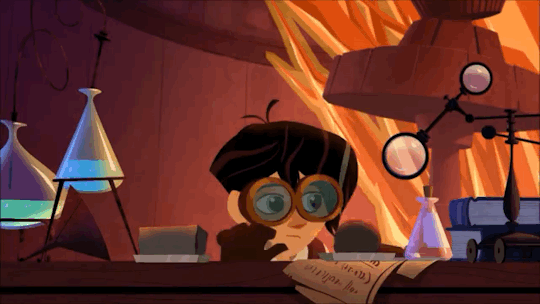
Oups, I forgot to give a list of general things happening instead of what happens each chapter, I need to make it faster, so, here we go again:
At Corona Expo, Varian meets Allistair Krei and they become friends, Krei stopped Mr. Croix from damaging Varian's invention, so, the green vortex emergency doesn't happen.
Varian takes Krei to meet Quirin, both have a chat and that's when Krei offers a free scholarship for Varian at San Franstokio High School
Quirin is going to think about it and Varian is hyped about this futuristic city, meanwhile Var shows Krei the Ruins of Old Corona next to the mansion, then the whole house, and finally, his laboratory, (don't forget or little raccoon is already a frequent Varian visitor and friend)
And this is when Krei's greed reaches the highest point, definitely this kid is able to build awesome machines, and in his need of social interaction he even gives away some more of them to Krei.
Is he going to take advantage of this little kid admiration and accept all the presents? Yes!, but he is not that evil, if the kid gives more inventions, it will be thanks to his millionaire scholarship.
They go back to Quirin to hear his answer, and the answer is NO THANKS, ~boom~ , Krei gently express his worry and deception at this decition, and, with no offense purpose, just consider how Corona offers little opportunities for science, and as for prodigy children, here they have none, while in San Franstokio there are lots, so they won't ever feel alone or misunderstood, please reconsider.

I forgot to tell, in this alternative universe, I kind of vizualized how the black rocks problem would be a little more difficult to reach, because all of them would grow on the archeological cave system and on the plumb systems underground.
So, this time the government (King Frederick) would have more time and more tools to hide this from the population and from the princess, depopulation just now about how the water is starting to run off, and how the plumb system get swords for reasons unknown
So, there is less and less population on the borders of Corona, only the capital islands have not this problem (yet), Varian barely knows because the police body makes a better job restringging the access to these places.

And once Krei leaves, Quirin and Varian have a verbal figth similar to the one we say before the Amber incident, but this time is most oriented to the reality of this country, Varian is politely but angryly expressing his disgust about Antique Corona dying and getting-
Oups I have to go
Thankies for reading 🏵️🌸🪷💐🌷🌹🌷🌺🌺🪻🌷🌼🪷🌸🪻🏵️🪻
Before : https://www.tumblr.com/dangara2610/749882172862758912/610-migrant-from-corona-to-san-franstokio?source=share
Next:
#varian#tangled varian#tts varian#varian the alchemist#rta varian#varian tts#rapunzels tangled adventure#vat7k#varian and the seven kingdoms#Bh6#big hero 6#big hero 6 the series#big hero six#big hero six the series#bh6 krei#krei bh6#tts quirin#quirin#quirin tangled#rudigger#Rudigger tts#Rudigger Tangled
11 notes
·
View notes